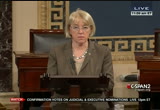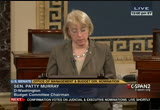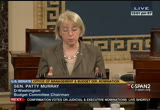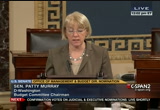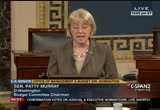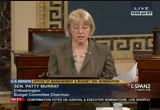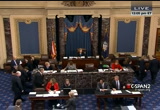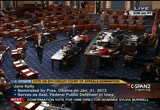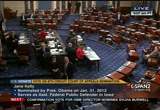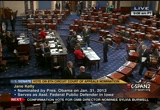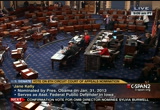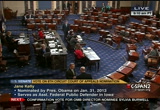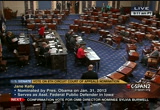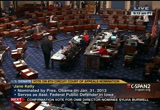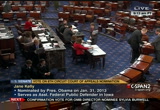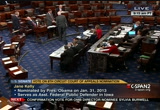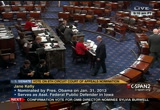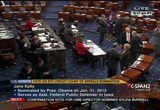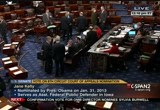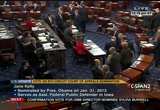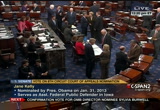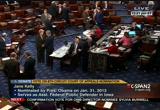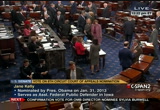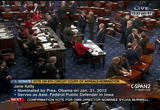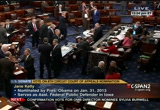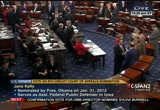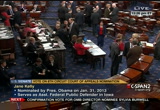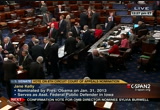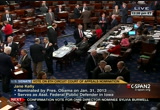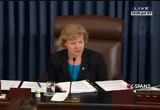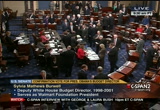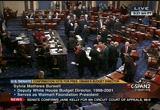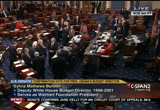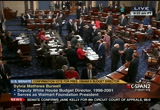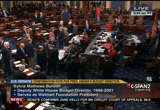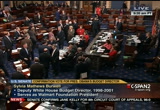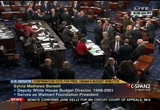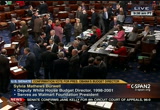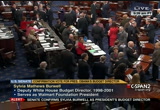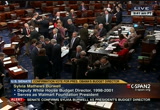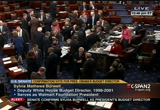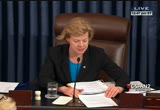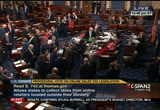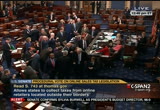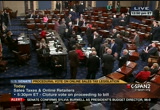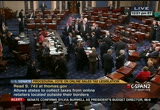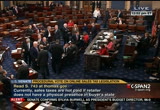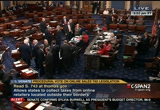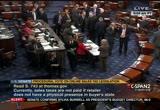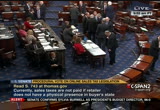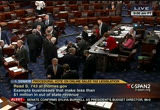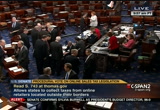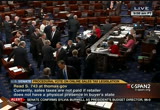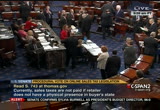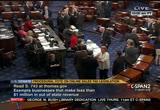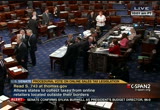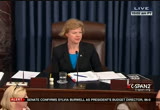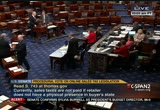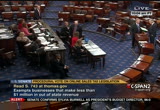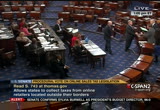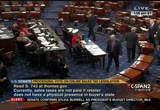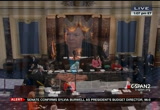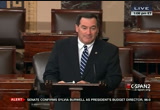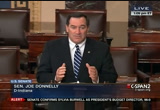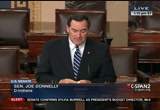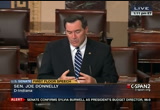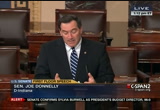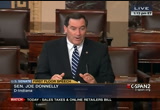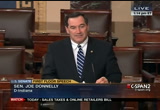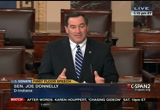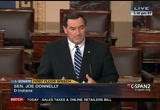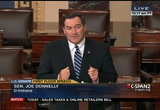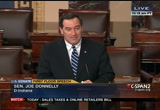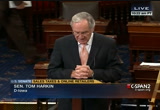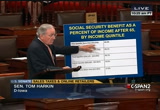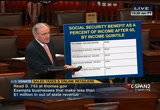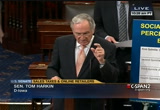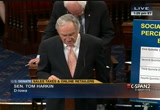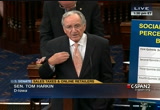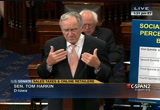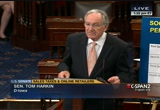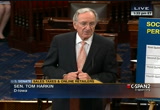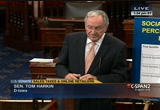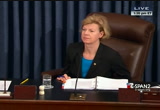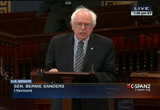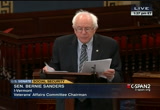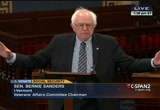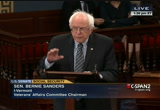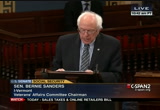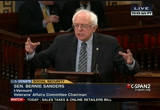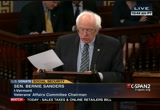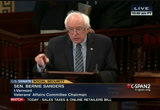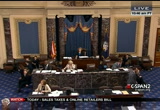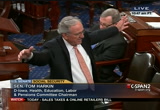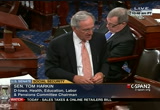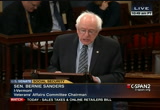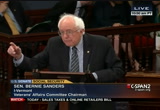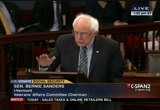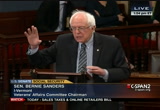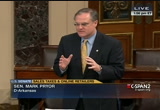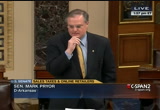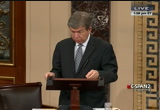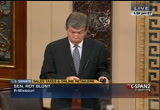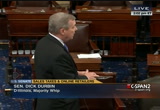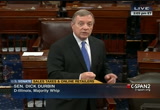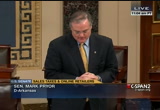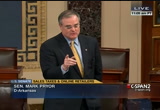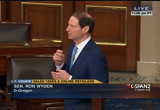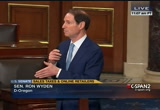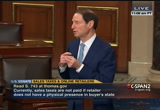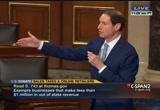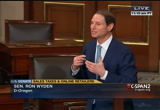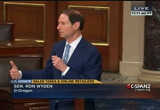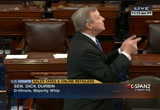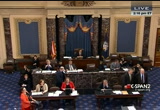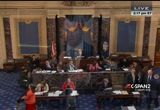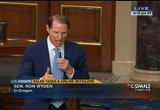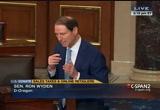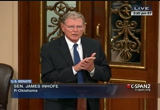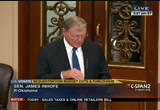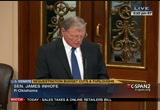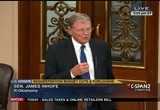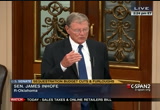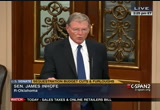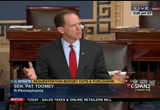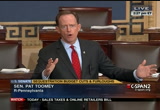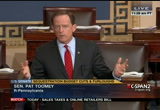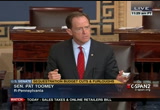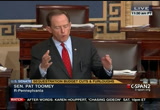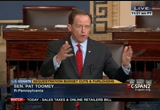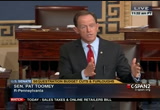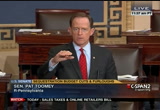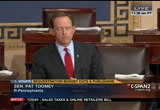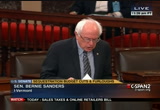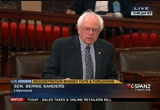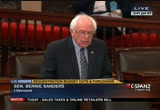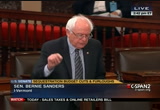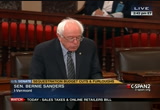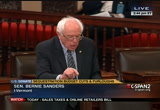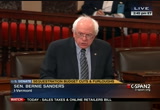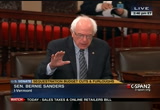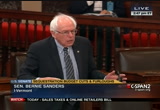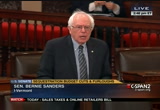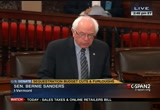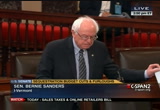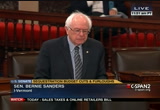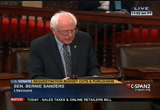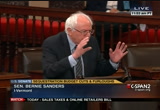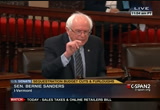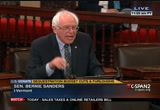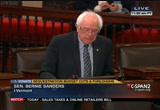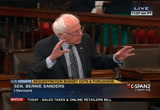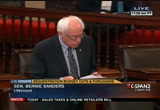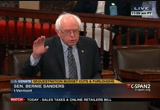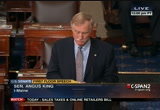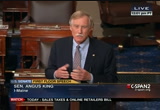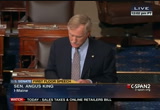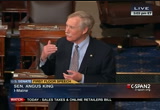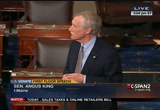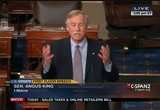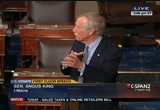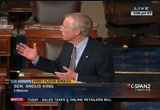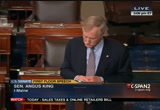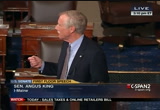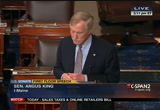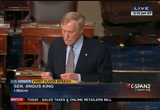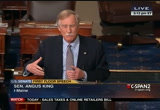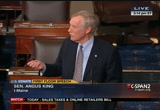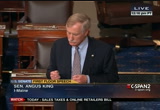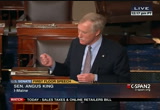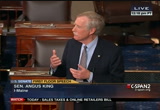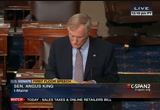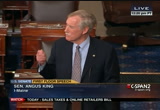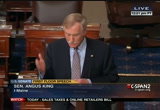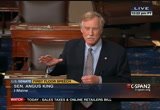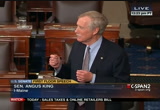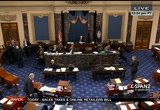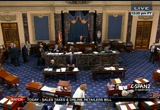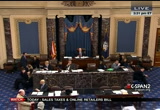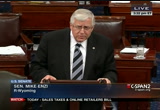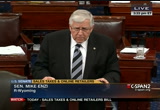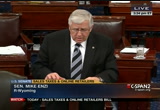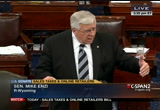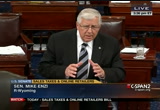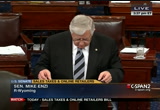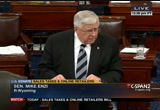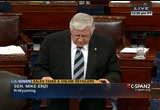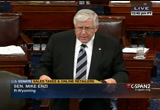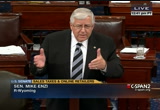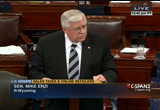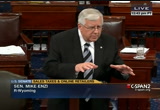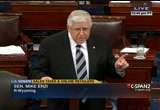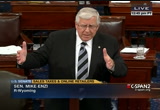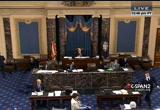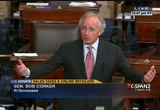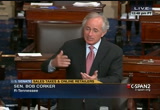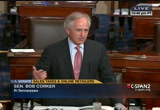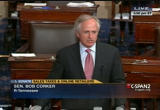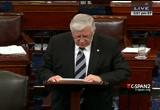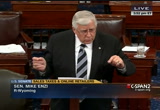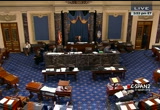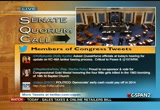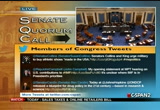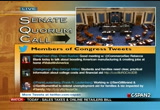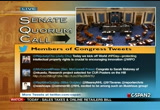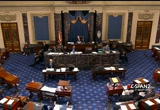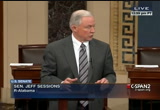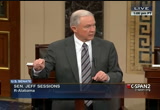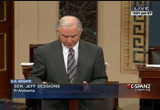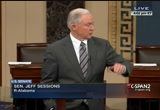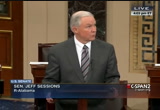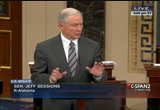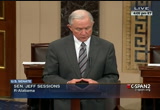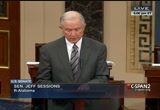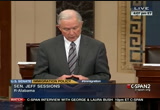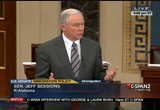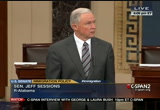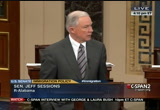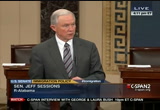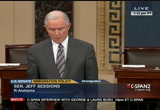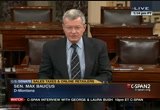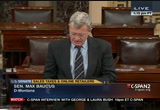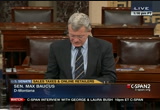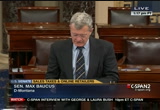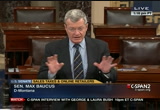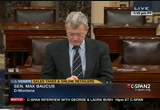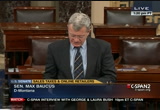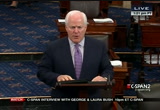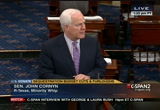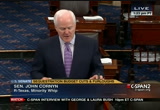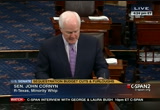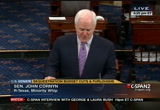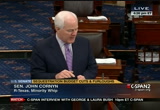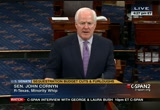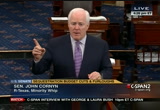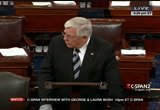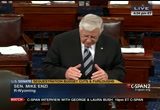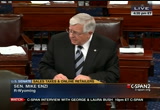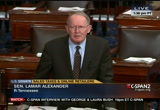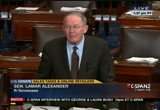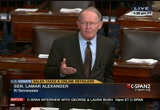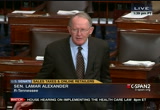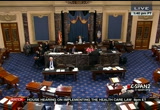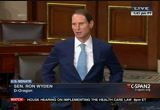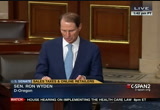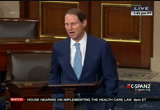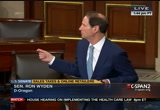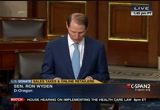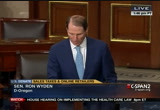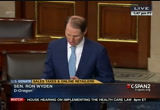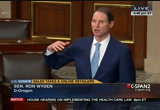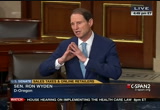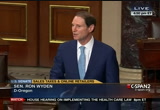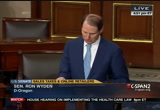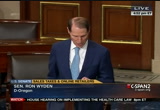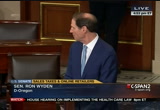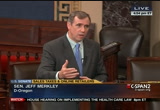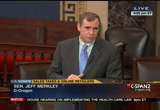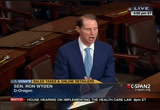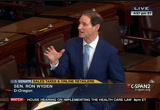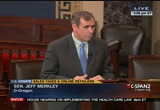tv U.S. Senate CSPAN April 24, 2013 12:00pm-5:00pm EDT
12:00 pm
sylvia mathews burwell. the presiding officer: is there objection? without objection. mrs. murray: thank you, madam president. and i thank senator sessions and rise to speak in support of sylvia mathews burwell whose nomination to be the next director of the office of management and budget was approved last week with strong bipartisan support by our senate budget committee. as we all know, our country does face serious fiscal and economic challenges that we have got to work together to address. the american people are looking to us to end this constant artificial crisis and political brinksmanship that are really threatening our fragile economic recovery. they want us to come together around fair solutions that work for our middle class, help the economy grow and tackle our deficit and debt fairly and responsibly. it is time that we stop governing from crisis to crisis and return stability and regular order to our budget process.
12:01 pm
that is why i'm so pleased that we have such an exceptional and qualified nominee to lead o.m.b. in sylvia burwell. i know she's the right person to come into this leadership role at this important time for our country. she is no stranger to o.m.b. or to tackling important fiscal issues. in the 1990's, she was a critical part of president clinton's economic team. she served as deputy director of the office of management and budget, deputy chief of staff to the president, and chief of staff to the secretary of treasury. in those roles she worked very closely with jack lew, erskine bowles, robert rubin and the rest of president clinton's economic team to help produce three out of the four budget surpluses in a row. during her tenure, our government took a fair and credible and a sustainable approach to our federal budget. that gave businesses the confidence to hire new workers and invest in their growth.
12:02 pm
her leadership and hard work in the 1990's helped to create broad-based economic growth that worked for the middle class and turned our debt and deficit problems around. madam president, sylvia's firsthand experience creating a balanced and responsible approach to deficit reduction makes her uniquely qualified to lead o.m.b. at this important time for our country. since the 1990's, sylvia has dedicated her life to helping people all over the world. as the president of the global development program and the chief operating officer at the gates foundation, she worked to improve the lives of millions across the globe. under her leadership, the foundation invested in important programs to help combat poverty and produce clean water and improve literacy and provide emergency relief to those who need it the most. most recently, as president of the wal-mart foundation, she led the foundation's charitable giving and focused on critical issues, such as hunger relief
12:03 pm
and women's economic empowerment. not only do sylvia's achievements in the foundation and philanthropy worlds demonstrate her vast experience managing global budgets, but they also speak volumes of her values and demonstrate her deep, lifelong commitment to serving others. sylvia grew up understanding the value of hard work and public service. her parents have both been community leaders in west virginia for over a half a century. her father's a longtime optometrist and her mother, the honorable cleo matthews, served as the mayor of her hometown of hinton and later served on the west virginia state board of education for a decade. as my colleague, senator manchin, said when he introduced her to our budget committee, it's easy to see that public service is a part of sylvia's d.n.a. madam president, as the director of o.m.b., sylvia will help set our nation's priorities and make tough decisions about our federal spending.
12:04 pm
so i'm glad that sylvia knows that budgets are about more than abstract numbers and partisan back-and-forth. as a second generation of -- as a greek american, sylvia understands the importance of the promise of american opportunity. she knows budgets are a reflection of our values and our priorities and that they are about families across the country whose lives and future are impacted by the decisions that we make. madam president, not only is sylvia an expert on domestic economic policy and a dedicated public servant, she has a demonstrated track record of working across the aisle to get things done. during her time in washington in the 1990's, she reached across the aisle and negotiated the balanced and fair budgets with republicans in congress. she knows that working to find common ground is the key to solving our fiscal challenge, a point made clear by her during her confirmation hearing in front of our senate budget committee this month. so i'm pleased that her nomination has passed our
12:05 pm
committee on a voice vote with strong bipartisan approval. republicans, including senator sessions, who here on the floor have praised sylvia as someone who is by all accounts well-liked and an able leader with commitment to public service. so, madam president, i support this nomination. i urge our colleagues to vote "yes," and i yield back the remainder of my time. the presiding officer: all time has expired. the question is on the kelly nomination. a senator: ask for the yeas and nays. the presiding officer: is there a sufficient second? there appears to be. the clerk will call the roll. vote: vote:
12:29 pm
wishing to vote or change their vote? if not, the yeas are 96, the nays are zero, and the nomination is confirmed. under the previous order, there are two minutes equally divided prior to a vote on the burwell nomination. who yield time? all time is yielded back. the question is on the nomination. is there a sufficient second? there appears to be. the clerk will call the roll. vote:
12:47 pm
the presiding officer: are there any senators wishing to vote or change their votes? if not, the yeas are 96, the nays are 0. the nomination is confirmed. mr. reid: madam president? madam president? the presiding officer: the majority leader. mr. reid: i ask unanimous consent the next vote be ten minutes in duration. the presiding officer: without objection. under the previous order, the motions to reconsider are considered made and laid on the table, the president will be immediately notified of the senate's action, and the senate will resume legislative session. under the previous order, the senate will resume consideration of the motion to proceed to s. 743, which the clerk will report.
12:48 pm
the clerk: motion to proceed to calendar number 41, s. 743, a bill to restore states' sovereign rights to enforce state and local sales and use tax laws, and for other purposes. the presiding officer: under the previous order, the question occurs on the adoption of the motion to proceed to s. 47 -- 743. a senator: ask for the yeas and nays. the presiding officer: is there a sufficient second? there appears to be. the clerk will call the roll. vote:
1:07 pm
their vote? if not, the ayes are 75, the nays are 22, and the motion to proceed is agreed to. mr. reid: madam president? the presiding officer: the clerk will report the bill. the clerk: s. 743, a bill to restore state sovereign rights to enforce state use taxes and for other purposes. mr. reid: madam president, i have an amendment at the desk. i ask the clerk to report. the presiding officer: the clerk will report the amendment. the clerk: the senator from nevada, mr. reid, for himself, for mr. enzi and others, proposes amendment numbered 741. mr. reid: madam president, i have a cloture motion at the desk. the presiding officer: the clerk will report the motion. the clerk: cloture motion, we the undersigned senators in accordance with the provisions of rule 22 of the standing rules of the senate hereby move to bring to a close the debate on s. 743, a bill to restore states' sovereign rights to enforce state and local sales and use tax laws, and for other
1:08 pm
purposes, signed by 17 senators as follows -- mr. reid: madam president, i ask unanimous consent that reading the names be waived. the presiding officer: without objection. mr. reid: i now ask unanimous consent that the mandatory quorum under rule 22 be waived. the presiding officer: without objection. mr. reid: madam president, i now ask unanimous consent that senator donnelly be recognized for up to 20 minutes to give his maiden speech. we will proceed as if in morning business. and following his speech, i ask unanimous consent that senator durbin be recognized, the manager of the bill. the presiding officer: without objection. mr. donnelly: madam president? the presiding officer: the senator from indiana. mr. donnelly: madam president, one of the best parts about this job is getting the chance to talk to hoosiers here in washington, back home in indiana and on those special occasions, a chance to see our hoosiers when they are serving our country overseas. when i was visiting our service members in afghanistan and coast province in july, 2009, i asked
1:09 pm
our indiana national guard members if there was one thing i could do for them, what would that be, and i expected them to tell me about safety vests or about new trucks, and they said joe, we have this handled here. what we need more than anything is a chance to have a job when we get home. we owe our service members that opportunity. from hoosiers serving our nation in afghanistan and around the world to the communities of vincennes and madison and plymouth and gary, the message is the same everywhere. it's about jobs and the chance to go to work and take care of your family. so how do we take a hoosier commonsense approach, focus on jobs and create the conditions needed for our people andure businesses to succeed? -- and our businesses to
1:10 pm
succeed? i propose an opportunity agenda. government doesn't create jobs. businesses create jobs. so let's create the opportunities, help put the conditions in place for our businesses in indiana and around the country to be able to create more jobs, put the programs in place for all of the american people to be ready to hit the ground running on day one. because, madam president, if we don't have a job, nothing else works. we can talk about health care, we can talk about climate change, we can talk about any other issue, but if we don't have the chance to go to work and earn a living and take care of our family, nothing else works, and that's why earlier this month, i conducted a series of roundtable meetings in eight different hoosier communities trying to get ideas from hoosier businesses, community leaders and educators, asking one simple
1:11 pm
question -- how can we help you, our entrepreneurs, our small business owners, the men and women who go to work every day, how can we help you create more jobs? so in creating an opportunity agenda built on hoosier common sense, i heard loud and clear the place to start is with education and with training. in every community i went to, i heard about the skills gap. jobs that are currently going unfilled, opportunities that are there for the taking, but we have to have workers who have the skills our employers need. getting a job is a two-way street. both hoosier companies and hoosier workers have responsibilities. you can't expect a good job and good pay if you don't bring some skills to the table. i heard from a welding trainer in gary, indiana, from an i.t.
1:12 pm
company in noblesville and from rural health care providers in terre haute, indiana, and the message was the same and it resonates across the board and across the state. employers need more skilled workers. good skills equal good jobs. that's why i helped introduce the bipartisan america works act which modifies federal training programs to place a priority on those programs and those certifications demanded by today's businesses and today's industries. the improvements in this bill are a benefit for both workers and employers. workers would know that the time they spend training is more likely to lead to a good job, and for employers, they will be more likely to hire people who they know have the training they need to be productive the moment they walk in the door. we also have to make sure our businesses do not get overwhelmed by regulations.
1:13 pm
in fort wayne, i heard about businesses dealing with too many regulations that don't make any sense for their particular industry. it's time to get rid of the bureaucratic mess and to keep what works. regulations should be like the umpire on the field. make sure everyone's playing by the rules, make sure that the rules are common sense, and then stay in the background. regulations should protect the health and safety of our families and our workers while not creating a necessary -- creating unnecessary burdens for our business owners. further, the regulatory systems should give businesses the certainty they need to plan for the future and the ability to compete with anyone anywhere in the world. we need to go all in on american energy. this helps our businesses, helps our families and helps national security. i was in lawrenceburg, indiana, a beautiful town right along the
1:14 pm
ohio river, and when i was there, one of -- one of the companies located there, a trucking company, they were trying to turn their fleet into a natural gas fleet. they were interested in making that transition, but the front-end costs are high and the infrastructure isn't in place yet. so developing american energy sources makes sense for american business, makes sense for our families and makes sense for national security. let's keep more of our hard-earned dollars in indiana, or, madam president, in your home state of wisconsin by investing in home-grown energy, solar, coal, wind, oil, natural gas, biodiesel, ethanol, nuclear. we are blessed with an abundance of energy right here in america. it makes us stronger, creates jobs, reduces our debt and gives us a chance to make our nation safer. i support projects like the
1:15 pm
keystone pipeline because it creates jobs, puts people to work and has significant bipartisan support. that's an example of a commonsense investment in domestic energy that both sides of the aisle can support. these are just a few of the ideas i've gotten from people who are creating jobs, running businesses, meeting payroll, employing our neighbors, and growing our businesses all across indiana. there is is a whole lot more wisdom, madam president, in washington, indiana than there is in washington, d.c. a big reason for this is because hoosiers like many americans are focused on just getting things done, working together. it's not about partisanship and it's not about politics. in indiana, it's about common sense and trying to solve the problem. it's about an opportunity agenda
1:16 pm
that creates jobs for hard-working people and a good life for their families. that's what it's all about. and here's what i'm about: taking the best ideas from both parties, both sides of this chamber, and getting things done. starting with jobs. as hoosiers, we don't care if you're a democrat, we don't care if you're a republican, we care if you're ready to go to work on what matters most. we make decisions based on what's best for our families. we take pride in making the checkbook balance and making tough choices necessary to make that possible. we expect the same from our government. keep taxes low, cut waste, and don't throw more money at the problem. just try to solve the problem. hoosiers are hard-working. we don't want a free lunch. all we want is a fair shake.
1:17 pm
we believe respect is earned through the sweat and the heart work that you put in every single day. we don't expect to receive anything we haven't earned. hoosier common sense tells us our families are all better off when we have stronger communities and more opportunities for businesses and and workers. we take care of our brothers and sisters in need. but not with a handout but by providing them with the opportunity to work hard and to build a better life. we have a proud tradition of senators from indiana who embodied these principles of hoosier common sense. from senator lugar's decades of lynne leadership in matters of commonsense foreign policy, in his leadership in saving over 100,000 hoosier auto jobs, and for his constant efforts on behalf of indiana's farmers from lake michigan to the ohio river, to senator burge
1:18 pm
bye's -- birch bye's birch bayh's efforts on title 9. to our senator and vice president dan quayle, his bipartisan efforts to pass jobs training legislation. senator evan bayh, flexing his independence and his passion to get our fiscal house in order. and my current colleague, senator dan coats, his efforts to keep our nation safe. the people of indiana expect their leaders to put hoosier common sense ahead of partisanship. we expect our senators not to be the loudest people in the building but the hardest working people in the building, and in my case, to make my job about making sure i'm looking out for their job. i'm honored to be here in this chamber working every day. not because i work for anybody here. i work for everyone back home.
1:19 pm
that's my mission, that's my job, and i'm incredibly privileged to do that. god bless indiana, god bless the united states. madam president, i yield back. mr. durbin: madam president? the presiding officer: the senator from illinois. mr. durbin: let me congratulate my colleague from my neighboring state of indiana, senator donnelly, on his first speech on the floor of the united states senate. i can tell you as a downstater in illinois i can identify with so many things he said about his state and his pride in his state, and his feeling about his responsibility as the new united states senator from the hoosier state. i thank him so much for that comment and look forward to working with him for many years to come as we represent adjoining states. madam president, on behalf of senator coons i ask unanimous consent that imatib nun be granted floor privileges for
1:20 pm
thursday, april 25. the presiding officer: without objection. mr. durbin: i have an amendment at the desk and ask that it be called. the presiding officer: the clerk will report the amendment. the clerk: the senator from illinois, mr. durbin, proposes amendment numbered 745 to amendment numbered 741. mr. durbin: i ask unanimous consent that the reading of the amendment be dispensed with. the presiding officer: without objection. mr. durbin: madam president, i'd like to explain where we stand on the pending legislation. this is a bill which has been introduced by senators enzi, alexander, heitkamp, and myself. it is s. 743. pending now on this bill is the manager's amendment which we have crafted and a second-degree amendment which is a slight technical change. the reason why we're at this stage is because we're looking for colleagues to come forward if they have amendments to this bill.
1:21 pm
we would like to entertain those amendments, we hope that they're germane and relevant amendments and not far afield from the importance subject matter before us. but i've made this announcement yesterday, again this morning, i'll make it now, any member of the senate who is intefd interested in amending this bill please come to the floor with your amendment. senator enzi and i will be happy to work with you if we can accept it, if we can't, at least give it an opportunity for debate and a vote. we want to finish this bill this week. we're going to stay until we finish. the sooner members get serious about about their amendments the more likely it is we'll be able to leave this week. that is the state of play on s. 743. i've spoken to the substance of this bill several times but i see some members on the floor seeking recognition, and at this point i yield. a senator: madam president? the presiding officer: the senator from iowa. mr. harkin: first i ask unanimous consent that sarene gere and anna porta be granted
1:22 pm
floor privileges for the remainder of today's session. the presiding officer: without objection. mr. harkin: i come to the floor today along with my colleague from vermont to introduce a joint resolution expressing the sense of congress that the so-called chained kipp should not -- c.p.i. should not be used for benefits for disabled veterans. as we work to reduce the deficit in a balanced and responsible manner, many have discussed changing the measure of inflation to calculate cost of living announces to a measure of inflation called the chained c.p.i. some claim the chained c.p.i. is a more accurate measure of inflation because it takes into account the fact that consumers may change their spending behavior and substitute items with lower priced increases for items with higher price increases. as a result of this feature,
1:23 pm
the chained c.p.i. results in a lower measure of inflation. now, all of this may seem very technical, but the impact of requiring social security or veterans disability colas, cost of living adjustments, to be based on the chained c.p.i. is anything but technical. it will have real and negative impacts on our seniors and those who become disabled as a result of service in the armed forces. in fact, the most adversely impacted would be the oldest and the poorest. i don't think anything could be more unfair or inappropriate or really unnecessary, unnecessary. as this first chart shows, the chained c.p.i. is a real cut in social security benefits. assort social security works, this policy would reduce annual social security benefits for the average worker at age 75 by $658
1:24 pm
a year, by age 85 by $1,147, and by ageth 95, by $1,622. over here you see the cumulative cut. in other words, what would happen over the years from 65 to 75, lose about $4,600. by 85, $13,000, by 95, you'd lose $28,000. i think a couple of things this chart shows you're penalized for living longer. the longer you live, the more you're penalized. you might say, well, 658 bucks a year by the time you're 75, that doesn't sound like a lot. not to some of us, not to us. look at our incomes, look at the retirement programs we have. of course, if you're in the upper quintile, of course,
1:25 pm
that doesn't seem like much. but, again, if you look at a second chart that i have here, you will see who really kind of really gets hurt. and it's the poorer you are. so if you are in the lowest quintile, lowest 20% of making money -- in other words, if -- let's put it this way. let's say you are 65 and your total income is less than $12,554 a year. that puts you below the poverty line. the total amount of your income that comes from social security is 84.3%. you might think if you're making less than that wouldn't all of your money come from social security? well, the answer is yes, but. and i question people about this. if you're making that little amount of money and you're over 65, you're probably working on some part-time job.
1:26 pm
you're babysitting maybe, you're cleaning houses, you're -- maybe you're a greeter at a store. you're probably doing something to add to your income but only amounts to about 16%. most of it comes from social security and you can see even if you get up to $20,000 a year, it's about the same, about 84% of your money comes from social security. so if you take a cut in social security, and you're lower income, that's where you get whacked the most. when you get up here, to the fifth quintile you're making more than 57,957 throors a year, only 17% of your income comes from social security. so you say if you took 600 bucks from that, you can probably afford it. but even if you look here at up to $57,000 a year in the fourth
1:27 pm
quintile, almost half, 43.5% of your total income, comes from social security. so even if you're making $30,000, $35,000 a year after 65, half of your income comes from social security. so, again, when you start making these kinds of cuts in the chained c.p.i., you might say, well, it's only $658 a year, well, for someone in the lower quintiles there, you know, that's like a month worth of food perhaps, maybe six weeks' worth of food. tell me that doesn't have an effect. of course, it has an effect. now, if you're in the upper income, don't have that much to worry about. the pernicious effect of chained c.p.i. is the longer you live, the more you're penalized and the lower your income, the bigger whack you're taking out
1:28 pm
of your total income. so, again, as people get older, they're more likely to have completed all the -- depleted all the sources of retirement income assuming they have any to begin with. a couple of facts that are pertinent here. first, today only one in five americans have a defined benefit pension that will last until the day they die. one in five. when i first came to the congress, it was one in two. one out of every two americans, madam president, had a defined benefit pension that would last them until the day they died. now it's one in five and it's getting less all the time. secondly, and this startles a lot of people -- 50% of the american populace have less than $10,000 in savings. less than $10,000. one out of every two americans has less than $10,000 in savings. well, you can see if you have
1:29 pm
that when you retire, that's going to be gone pretty soon so you're going to rely strictly on social security. you put those facts together, one out of five -- only one -- four out of five, four out of five have no pension, and only -- and half have less than $10,000 in savings, then you see that soon after you retire the only thing you've got left is social security. so it's already hard enough now for millions of people hoping to retire but then you put chained c.p.i. in there and you really are hitting the oldest and the poorest. so, again, i know people are saying, well, we got to -- got to do something to save social security for those in the future. i agree with that. whenever i see a really honest assessment of social security for the future, an honest assessment says social security
1:30 pm
can't continue to exist as it is. well, i agree with that. as it is. but then there are two approaches. do you whack the benefits or do you increase the revenues that come in to social security? two different approaches. we don't have to cut the benefits. in fact, i would say that by -- by talking about chained c.p.i., the signal you're sending to the younger generation is, well, maybe when you get there, we'll whack it some more. a lot of young people are saying, i don't know if social security's going to be there for me when i get that age. well, when they hear people talking about chained c.p.i. and cutting this, they're right to be worried whether or not we're going to keep our promise to this next generation that we will have a social security system that they can rely on and count on. and so what's to be done? well, last year i introduced
1:31 pm
legislation that would basically extend the life of the social security trust fund to 2050 and give a $65-a-month increase to every social security recipient and yet extend the life of it for over 18 more years. how do we do that? very simply, we raise the cap -- the wage cap of the people that pay in to social security from $113,000 a year, which it is now, over ten years we raise it and do away with it after ten years. now, there's another approach, too. the national association of -- of social insurers, nasi, did a poll earlier this year and they asked people, would you be willing -- young people, they asked working -- workers, would you be willing to pay -- go from 6.2% paying in to social security to 7.2%, a 1% increase over 20 years, if that would
1:32 pm
help secure social security? 80%, 90% of republicans and democrats who self-identified -- identified as that said, yes, over 20 years, a 1% increase? that's nothing. but if you were to take that and raise the wage cap, you could increase social security payments by $65 a month and secure social security for up to 75 years. now, it seems to me if you want to send a message to young people about the secure -- the sanctity and stability of social security, you would say that rather than we're going to cut it, we're going to have this so-called chained c.p.i. as i said, i know it sounds technical but it's not technical at all. i once likened chained c.p.i. to a -- an anchor chain. you're standing on the boat, the anchor chain gets around your ankle and someone throws the anchor overboard, where are you
1:33 pm
going? you're going down. that's what chained c.p.i. does. the older you get urk th, the mu get hit on it. and the poorer you are, the more you get hit. so again, this idea that -- that we've got to somehow cut benefits, have this chained c c.p.i. in order to save social security, is not -- it's wrong, it's just wrong. there are other ways of doing it that would be widely, broadly supported by the american people. go out and ask any group, ask any group of seniors, do you think we ought to raise the wage cap so that someone who's making $500,000 a year pays in at the same rate as someone who is making $50,000 a year? well, of course. that's not the case now. you make $50,000 a year, you pay in to social security on every dime you make. if you make $500,000 a year, you're only paying in on the first about 20 cents of every
1:34 pm
dollar you make. after that, you don't pay in to social security. i think the average american would say, that's not fair. what's good for someone making $100,000 a year ought to be the same for someone making a million dollars a year. and so there are other ways of securing social security. i -- i -- this chained c.p.i. sends the wrong message to young people. it -- it -- it exacerbates this concern that young people have, is social security going to be there for when i retire? i always tell them, well, do you believe the united states government will exist when you retire? and they say, yes. i say, well, if that's the case, social security will be there because it's backed by the full faith and credit of the united states government. now, what are we supposed to do? are we supposed to cut that full faith and credit and tell young people, well, it will there be but we may take cuts here and there may be cuts there and cuts there. what's a young person to think, am i really going to have what i think i'm going to be able to
1:35 pm
have and count on social security? this is a trust. my friend from vermont's always talking about this is a trust fund, it is a trust. it does not add to the deficit. it's a -- think about the word "trust." social security trust fund. you've got to be able to trust it. young people need to be able to trust it. that it will be there for them. the best way to undermine that is to go to this chained c.p.i. with that, madam president, i yield to my good friend who is -- who knows this issue better than just about anybody i -- i -- i know and -- and who has fought so hard on behalf of social security and keeping that trust fund and keeping the "trust" in social security. i yield the floor to senator sanders. mr. sanders: well, i want to thank my colleague, senator harkin, not only for his fight for seniors and disabled vets on this issue -- the presiding officer: the senator from vermont. mr. sanders: -- but for his long career fighting for those people who often don't have a voice
1:36 pm
here in washington. madam president, the time has come for the united states senate to send a very loud and clear message to the american people and it's the message that senator harkin has just articulated and that is that we are not going to balance the budget on the backs of the elderly, on the backs of disabled veterans, on the backs of those people who are already in the midst of this terrible recession hurting so much. as chairman of the senate veterans' committee, let me make it very clear that i will do everything that i can to make sure that we are not balancing the budget on the backs of disabled veterans, men and women who have lost their arms, their legs and their eyesight defending this country. that is morally unacceptable.
1:37 pm
madam president, the chained c.p.i. -- and this is an important point to make -- sometimes you hear the crescendo inside the beltway and all of the lobbyists talking, well, this is the right way to go. but as senator harkin just mentioned, go across america, from iowa to vermont, california to maine, the american people are saying in poll after poll, no, do not cut social security, do not cut benefits for disabled vets. and the organizations that represent tens of millions of people are saying the same things. madam president, the american legion, the veterans of foreign wars, the disabled american veterans, the iraq and afghanistan veterans of america, the gold star wives, the disabled american veterans, they are on record -- and i have submitted their testimony into the senate, into the "congressional record" -- are in
1:38 pm
opposition to this chained c.p.i. but it is not just veterans' organizations. the chained c.p.i. is opposed by every major senior citizen group in this country, the aarp, the national committee to preserve social security and medicare, the alliance for retired americans, other groups. the chained c.p.i. is opposed by every major trade union in america, including the afl-cio. the chained c.p.i. is opposed by every major disability group in this country. it is opposed by the national organization for women because they understand that cutting social security impacts women more than it does men. so, madam president, maybe once in awhile the united states senate might want to listen to ordinary americans, people who do not have well-paid lobbyists, people who do not own the local newspapers and do what's right for the american people.
1:39 pm
madam president, there are some who believe that lowering cost-of-living adjustments, colas, through the adoption of a so-called chained c.p.i. would just be a minor tweak in benefits. hardly worth discussing. but let's be clear. for millions of disabled veterans and seniors living on fixed incomes, the chained c.p.i. is not a minor tweak. it is a significant benefit cut that will make it harder for permanently disabled veterans and the elderly to feed their families, heat their homes, pay for their prescription drugs, and make ends meet. this misguided proposal must be vigorously opposed. madam president, what i find truly disturbing is that folks like treasury secretary jack lew and my republican colleagues who refer to the chained c.p.i. as -- quote -- "a more accurate measure of inflation." that's their argument.
1:40 pm
their argument is, and this -- when i tell it, senator harkin, when i speak to seniors in vermont and i tell them that there are some people in washington who think the current colas are too generous, do you know what invariably happens? they start laughing. and they should laugh. two out of the last four years they got zero. i think the last cola was 1.7%. and there are some in washington who think that is just too generous. so i would say, madam presiden madam president -- and i want to ask unanimous consent to enter into the record a statement from 250 ph.d. economists and 50 social insurance experts who wrote -- and i quote -- "no empirical basis for reducing the social security cola." "no empirical basis." and i ask unanimous consent to introduce that document. the presiding officer: without objection. mr. sanders: and this is what these economists, 250 economis economists, write -- quote -- "as economists and social insurance experts, we agree that the annual social security
1:41 pm
cost-of-living adjustment should be based on the most accurate measure possible of the impact of inflation on beneficiaries. for this reason, we oppose proposals to reduce the social security cola by tying it to a chained consumer price index. arguments in favor of reducing the cola are premised on the assumption that the current cola overcorrects for inflation. however, it is just as likely that the current cola fails to keep up with rising costs confronting elderly and disabled beneficiaries." and i ask, as i've said, unanimous consent to insert the full text of that letter into the record. the presiding officer: without objection. mr. sanders: and the reason for that is pretty clear. if you're a senior citizen or disabled vet, the likelihood is you're not just buying ipads or flatscreen tv's or other --
1:42 pm
other types of things like that. what are you buying? you're buying health care, you're buying prescription dru drugs, you're trying to heat your home. and for seniors' purchasing habits, in many ways, inflation has been higher, not lower, than general inflation. madam president, senator harkin made -- as senator harkin made reference to, let's be very clear. there are millions and millions of seniors who are economically struggling -- struggling -- to keep their heads above water, to buy the prescription drugs they need, to pay for their health care costs they need, to keep their homes warm in states like vermont or iowa in the winter. nearly one-quarter of seniors depend on social security benefits for 100% of their income. 100% of their income. two-thirds depend on social security for a majority of their incomes. and now we are talking -- you know, i hear from the white house and elsewhere, they're going to protect the poorest of
1:43 pm
the poor. well, to my mind, when somebody in vermont is trying to get by on $15,000 a year, that person needs protecting. anyone who thinks that is a lot of money clearly doesn't have any sense of what's going on in the real world. madam president, according to the social security administration, under the administration's chained c.p.i. proposal, average 65-year-old retirees would lose $658 a year in social security benefits by their 75th birthday, a cumulative loss of over $4,500. now, once again, i understand the people here go for lunch, take a few friends out, you could spend 600 bucks. but for senior citizens, for senior citizens struggling on $14,000 or $15,000 a year, $658 is a lot of money and means the loss, if you don't have that money, of -- of very, very basic
1:44 pm
needs. for veterans, if we move -- go the route of the chained c.p.i., disability benefits for veterans at age 30, they would have their benefits reduced by $1,425 a year at age 45, $2,300 at age 55, $3,200 a year at age 65. benefits for surviving spouse spouses -- spouses --, the wives whthe wiveswho lost their husbas in afghanistan and their kids, would also be cut. and i think as a senate, as a congress, we should take a deep, deep breath if we think we should be balancing the budget on those people who have already given so much to this country. so, madam president, let me just conclude again making the point that senator harkin so ably ma made. all -- well, not all of us, but
1:45 pm
many of us want to make sure that social security is strong not just for the next 20 years in which it can pay out all benefits but for the next 75 years. and the way you do that is not to cut benefits, but the way you do that is exactly as senator harkin has suggested, as i have suggested, many other people have suggested, and that is understanding that something absurd, when someone who makes $5 million a year contributes the same exact amount of money into the social security trust fund as somebody making $113,000 a year. there are different ways you can approach that issue, but by lifting the cap -- by lifting the cap and doing it one way or the other, we can make social security solvent for the next 75 years for our kids and for our grandchildren. last -- last point. senator harkin, you have been a leader on this issue. pointing out how many americans have lost their pensions. we are probably in worse shape than at any time in the modern history for the average person to go into retirement. social security is and has been
1:46 pm
the pillar for those people. they have lost their pensions, their 401-k's have also been troubled, social security has been there for the last 75-plus years, in good times and bad times, paid out every nickel owed to every eligible american. people are nervous about their retirements. let us, madam president, stand united and say we are not going to cut social security benefits for seniors, for disabled vets. there are other ways to go forward to make sure that social security is strong for the next 75 years. and with that, i would yield the floor back. mr. harkin: would the senator just yield for a question? first of all, i want to thank my colleague from vermont for being a strong voice on this issue and so many issues that affect the elderly and especially our veterans, as the senator chairs that committee. i just -- i'm always curious as to why it is that so many of the
1:47 pm
dark suits here in washington are always after social security somehow -- and i don't -- i don't -- i don't say that there are -- there are any -- that there is some ill spirit there that they are wanting to do -- although i will say, i think the senator might agree, that there are some who would like to privatize social security. we know that, they have said that in the past, or partially privatize it. but it just seems to me that so many people who get involved in this, they think this is just a little nick. i saw a cartoon, a barber cutting somebody's hair and they had this huge hair -- ball of hair and they were just nipping a couple little hairs off of it as, you know, saying that's called we're doing with chained c.p.i. they think it's such a small thing, but it occurred to me --
1:48 pm
i say to the senator it occurred to me that those people making the decisions, the dark suits, these were all people that have probably good pensions, good retirement systems. they're never going to want for anything. and yet, somehow they just think well, 658 bucks, that's no big deal, up to 75. but as the senator pointed out, $650, $658 in one year to someone whose income is $15,000, that could be a month's worth of food, six weeks' worth of food. that's a big whack. so i -- i just ask the senator again what -- any thoughts on -- on why it is that we can't seem to go out and listen to people and come up with some other kind of an approach on this rather than cutting -- getting this chained c.p.i. mr. sanders: that's a very important question, and let me answer it in several ways. for a start, let's be clear. we have some colleagues in the house and the senate who believe
1:49 pm
not just that you should privatize social security, not just that you should cut social security. they believe that the concept of government assistance in terms of retirement or government programs in terms of health care, they believe they are unconstitutional. they don't believe the government should be there, that if you are elderly and you have no health care, sorry, hey, you're on your own. so that's number one. there is a philosophical belief on the part of some that what government does should be very, very limited, and we should not be there to make sure that when the elderly people reach retirement age, they have security. the second issue, i would say, senator harkin, is one of the consistently -- and this has gone on for years, long-term opposition to social security. do you know what it's about? it's because social security has worked so well.
1:50 pm
if you hold the belief that the government is terrible, the government is awful, the government can't do anything and you have a program which for 77 years has paid out every nickel owed to every eligible american, has a very modest administrative cost, is very, very popular among the american people, you don't believe in government, that's a bad thing. you have got to start cutting it and doing away with it. third point that i would make, again no secret here, we have a significant deficit and we have choices to make as to how we deal with the deficit. i think that when we lose $100 billion every single year because corporations stash their money in the cayman islands and in other tax havens, maybe we might want to ask them to start paying their fair share of taxes rather than cutting social security. but we have colleagues who are much more interested in the well-being and the profits of large corporations than they are in the needs of seniors. so those are some of my answers.
1:51 pm
mr. harkin: a couple of thoughts, i just say to my friend from vermont. those who say it is unconstitutional to do those things, i wonder if they ever read the preamble to the constitution, which is, by the way, a part of the constitution of the united states. we the people of the united states in order to form a more perfect union, establish justice, ensure domestic tranquillity, provide for the common defense, promote the general welfare. that's part of the constitution of the united states. so how we do that obviously can vary from time to time, generation to generation, but the idea that we are here to promote the general welfare as a federal government is clearly in the constitution of the united states. secondly, the senator in his statement pointed out that the idea that social security, that this is really a trust fund. people pay into it, they take
1:52 pm
out. again, it's had some problems, but i ask the senator if unemployment today were down to less than 5%, say 4%, what would the social security trust fund look like? mr. sanders: it would be much larger than it is right now because more people would be paying into it. mr. harkin: and so that date, that 2032 date, if we make no changes, they say social security will pay 100% out up until 2032, i believe it is now, something like that, that if, in fact, we reduced unemployment down to, say, less than 5%, that 2032 becomes 2050, 2060, 2070 and on. mr. sanders: that's right. but i think the point has to be made -- and i see senator durbin here on the floor as well, and he's made this point -- is that we can argue about how you go forward on social security but we should be clear, madam president. social security hasn't contributed a nickel to the deficit because it's funded by
1:53 pm
the independent payroll tax. so it is a reasonable question as to how we make social security solvent for 75 years rather than just the next 20 years. that's a good debate, and we should you and i have similar ideas on how we should tackle that issue, but it should not be considered as part of the deficit reduction effort, and it disturbs me very much because the administration has acknowledged that reality and we have heard from them over the years that say yeah, we want to deal with social security but not part of deficit reduction. it bothers me that they have now injected social security into the deficit reduction debate. mr. harkin: one thing i say to the senator, you mentioned that -- that we have a deficit. we do. we have to address it. we all agree with that. the senator pointed out the offshore haven businesses are not paying their fair share of taxes. i might ask the senator also one other question. isn't it a fact that, well, the estimates vary, but a trillion dollars is not stretching the
1:54 pm
truth to say that the war in iraq costs us somewhere close to a trillion dollars. mr. sanders: i would say that most estimates suggest that -- if you look at both iraq and afghanistan, it may be three times that number. mr. harkin: i don't know, but i have seen estimates up to a trillion dollars about iraq only. that was all borrowed money. so that has to be paid back. so -- so are we going to make the elderly and the poor and the students and the veterans pay for that? mr. sanders: i would say you make a very, very good point. i often point out to my republican friends that you are looking at myself and i think yourself as some of the major deficit hawks. our friends today who want to cut social security in the name of deficit reduction apparently didn't have a problem with the deficit when they went to war in iraq and afghanistan without paying for those wars, and they gave huge tax breaks to the wealthiest people in this country without offsetting those tax breaks. so your point is very well
1:55 pm
taken. okay. i would yield back. mr. durbin: madam president? the presiding officer: the senator from illinois. mr. durbin: madam president, before i yield the floor to the senator from arkansas, i would like to again make the point that i made earlier. pending before the senate is s. 743. this is the marketplace fairness act cosponsored by myself, senator enzi, senator heitkamp, senator alexander and others. this matter is now pending before the united states senate, and we are asking all members with amendments to please bring them to the floor. i know the senator from arkansas has heard that call and that's why he's here. but we want to move this forward. we want to have an active debate on this issue, and we're asking our colleagues not to put it off if we want to wrap this up in a timely fashion, we need their cooperation. i urge all offices if you have an amendment, please come to the floor and discuss it with senator enzi and myself, and i yield the floor.
1:56 pm
a senator: madam president? the presiding officer: the senator from arkansas. mr. pryor: i want to talk about amendment 740, the amendment i am doing with the senator from missouri, senator blunt. we understand that there will be an objection to this, so i am not going to ask unanimous consent to call it up at the moment. hopefully one of our colleagues will show up in a few moments to do that. but, madam president, let me say first that i am for the marketplace fairness act. i'm a cosponsor of that. i think it's the right thing to do. it's an issue i have been on since my time more than 10 years ago as attorney general in the state of arkansas when we were trying to set up a multistate compact about how to collect sales tax on the internet. this is taxes on internet sales on the internet. what i'm talking about today, the pryor-blunt amendment, is different. we're talking about amendment 740, which is sometimes confused with it, but basically amendment
1:57 pm
740 deals with the internet tax freedom act, sometimes called itfa, of all things, but nonetheless basically it does a few things. first, it makes it clear that online retailers will not begin to have to pay additional tax just for doing business online. and so the way this works, madam president, is that right now states and cities and counties, et cetera, are prohibited from taxing internet service. we're not talking about sales tax. we're talking about internet service on the internet service itself. and this is a moratorium that has been around for a long time. amendment 740 is the -- is the amendment that would extend this for ten years. this is a clean extension. basically, there are some states that have been grandfathered
1:58 pm
under the current moratorium, they will continue to be grandfathered. we do not cover things like voice, audio, video. that's a separate issue. we're talking about just the internet itself, and this also does not have any negative impact on the universal service fund, 911, e-911 and other fees like that. those are separate. we have crafted this very, very carefully to do just a straight and clean ten-year extension. now, we understand there will be an objection to this. before we hear that a objection, i'd like to yield the floor to my colleague from missouri because i know he has another engagement he needs to get to. the presiding officer: the senator from missouri. mr. blunt: i thank you. let me quickly yield to my friend from oklahoma for a u.c. request. the presiding officer: the senator from oklahoma. mr. inhofe: i ask unanimous consent that at the conclusion of the remarks of the senators from arkansas and missouri, that i be recognized as if in morning
1:59 pm
business. the presiding officer: without objection. the senator from missouri. mr. blunt: madam president, as my good friend from arkansas said and for the benefit of the senator from oregon, we haven't made a request yet for this amendment to be moved to the front of the line to be debated, but we are here to say that we'd like to have this amendment on this bill. we're both supporters of the marketplace fairness act for reasons that i hope we have well established and i think people, including members of the senate, are beginning to understand that it's a fairness principle, but what this amendment does, recognizing the importance of online commerce, that it's grown dramatically since 1998 when this amendment first became part of the law, the internet tax freedom act, and in 1998, it said you wouldn't tax the internet itself for use of the
2:00 pm
internet. unless we act, this law would expire in 2014, and this would be a ten-year extension that would just simply say that we would continue to ensure that people's access to internet services is tax free. to be clear, the underlying bill we're considering, the marketplace fairness act, doesn't create a new tax, it doesn't tax consumers' use of the internet which senator pryor and i both would oppose taxing use of the internet at this point, but this simply adds to the fair tax collection processes that would be available to states under the marketplace fairness act by extending current law to assure without any question that this is not about taxing the internet, in fact, this amendment would extend for a
2:01 pm
decade the almost 15-year prohibition on extending the internet, the one -- on taxing the internet, the one that goes back to 1998. and so i support the marketplace fairness act. i believe this bill would be even better if it clarified for the next decade that we continue to maintain the view that the congress and the federal government have had on the internet since the internet first emerged as a -- an avenue of commerce and would not allow for the taxing of the internet, and it prevents those taxes from being collected. i'd yield back to my friend from arkansas. mr. durbin: madam president? the presiding officer: the senator from illinois. mr. durbin: madam president, i would like to ask the senator from arkansas if he would yield for a question through the chair. mr. pryor: i'd be glad to, madam president. mr. durbin: pending before us is
2:02 pm
s. 743, the marketplace fairness act, and this legislation would require internet retailers selling into states with sales taxes to collect the sales tax. now, the senator from arkansas and the senator from missouri have offered a different piece of legislation relating to the internet and i would like to ask the senator from arkansas if he would please clarify a few things. is there any tax imposed by this marketplace fairness act on the use of the internet? mr. pryor: no, there is no tax in this amendment 740, in fact, what it does, it extends the moratorium of no tax on the internet. mr. durbin: i'm asking before your amendment is adopted, the underlying bill has no tax on access to the internet. mr. pryor: that's correct. mr. durbin: what you're suggesting is the extension of protecting americans' right to access to the internet from being taxed. is that correct? mr. pryor: that is correct. mr. durbin: for those who would
2:03 pm
come to the floor and argue somehow this bill is going to inhibit or restrain americans in the use of the internet, it does not, and the pryor and blunt amendment which is being offered extends for ten years this prohibition against taxing access to the internet. i ask the senator from arkansas, the last time this was considered, does the senator know when and what the disposition of that matter was? mr. pryor: you know, i'm not familiar with the history of that. would the senator from illinois know that? mr. durbin: my impression is, it was adopted by voice vote, giving a seven-year protection was adopted by voice vote, it was clearly unanimous, at least there were no objections on a bipartisan basis. so what is being offered by the senator from arkansas and missouri on behalf of internet users all over the united states to protect them from being taxed on this measure is over and above anything in this bill but consistent with policy that we've lived with i believe for
2:04 pm
15 years if i'm not mistaken. i think the senator from missouri mentioned it was 15 years. so from my point of view this is a friendly amendment, it is an amendment which is good for america, it protects our access to the internet, it does not jeopardize, does not jeopardize the underlying legislation, in fact, if i'm not mistaken, the cotwo sponsors are cosponsors or have at least supported the marketplace fairness act. i thank the senator from arkansas for yielding are for those questions. mr. pryor: i see our colleague from oregon is here who has a long history with this legislation and other legislation like it. let me just make one final point before i try to set aside the current amendment and bring up 740 to make it pending. but my final point is this: the internet has been an amazing success story, it's unbelievable how successful it's been, how diverse, how robust. but we think of it as ewe bit
2:05 pm
quickous. the truth -- ewe bick quitous. in the united states, 80% of households have access to the internet but only 65% of the people take it. only 65% of the people in the country actually utilize the internet and take internet service. i'm afraid if we do add a tax, if the state and local governments add a tax it's going to make it less affordable. you know as well as i do, mr. president, that a lot of people don't take internet service because they just can't afford it and i'm afraid if we allow state and local governments to tax access to the internet, to tax the service itself, we're going to see that effort hurt even more. so what i'd like to do, mr. president, is i'd like to ask unanimous consent that we set aside the pending amendment and call up amendment 740 to make it pending.
2:06 pm
mr. wyden: reserving the right to object, mr. president. the presiding officer: is there objection? mr. wyden: reserving the right to object. the presiding officer: the senator from oregon. mr. wyden: thank you, mr. president. i do this just to have a colloquy with my friend from, you know, arkansas. i want him to understand i have stayed off the floor of this body for really well over a day for the sole purpose of trying to see if we can bring both sides together on this issue. i think that's important and i've already acknowledged that i'm willing to look at how we could bring both sides together, recognizing the quill, you know, decision and i've already said that i'd looked at compacts between states and things of this nature. and i have made repeated offers to the advocates of this bill offering specifics on paper and essentially nothing is offered in return other than we've got
2:07 pm
the votes and we're going to coerce you as oregonians to go along with this. so what i want to do just for a moment is explain why i have to object. i think the senator knows i authored the internet tax freedom bill here in the senate back in 1998, and i did it because i thought it was important to have a defense shield against potentially thousands of taxing jurisdictions, singling out the internet for these kinds of taxes. and regettably, the underlying bill is going to be a targeted strike on the internet. it's not going to be a defense shield, it would as it stands today serve as an amendment that would undercut what we sought to do back in 1998.
2:08 pm
and as the original author here, i'm looking forward to working with the senator under any circumstance to reauthorize a law that i think has worked, all the law says is you got to do off-line what you do online. i mean if you really boil it down, it's a nondiscrimination kind of law. comes up next year. the commerce committee and the finance committee both had interests in this, and we've always worked together cooperatively on these kinds of areas. i remember our experiences with nan owe technology. -- nanotechnology and i just want to say i'm going to have to object at this time but i'm very interested in working with you, with senator durbin, with senator blunt, who was just here, to try to come up with an arrangement that goes to the heart of this question. and that is, should states like oregon be coerced, required to collect these online taxes for states that are thousands of
2:09 pm
miles away? and the refrain throughout this whole discussion has really been this is a states' rights bill. and i respect that. but what it really translates is folks say they're for states' rights if they think the state is right. and the state is willing to go along with this particular approach that's come out of washington, d.c., which is they would be coerced into collecting these sales taxes for jurisdictions from thousands of miles away. and in some cases, new hampshire and others places have been making this point as well, it would be discriminatory because the online sector would be subjected to requirements that were not available -- were not required of brick-and-mortar retailers which undermines our vision for the tech sector which is about bricks and clicks.
2:10 pm
we want both the brick-and-mortar people and the online dealers to do well. and i know the senator from arkansas agrees as well. i haven't said, on a matter my constituents feel very strongly about for going on two days until now solely pour the purposes of working my friend from arkansas, the distinguished leader from illinois, senator durbin, and we will continue to do it. but at the end of the day, states rights to some extent has to have an element of voluntariness. if states' rights has no element of voluntary judgments by states, it's pretty hard to say a state's got any rights. a state really is going to be coerced -- and we reached that point as i would characterize it where we're going to say in washington, d.c. we believe in states' rights if we think the state is right and they're going
2:11 pm
to go along with the approach we have dictated. in my part of the world to show the irony of the situation, washington state has a sales tax. oregon does not have a sales tax. there are deferential tax considerations in both jurisdictions, we omnibus make agreements in terms of how we do business. we've shown that it's possible to deal with this issue, and i want my colleague from arkansas and my friend from illinois to know that i am willing to set aside absolutely everything and work around the clock to see if we can find some common ground here with my theory being it really is hard to say it's a states' rights approach if a state is unable to have any element in the process with respect to its own judgments, its voluntary judgments about what it wants to do. so, mr. president, i would
2:12 pm
object at this time. the presiding officer: objection is heard. a senator: mr. president? the presiding officer: the senator from illinois. mr. durbin: mr. president, i'm disappointed. i'm disappointed because i know this was a good-faith effort on behalf of the senators from arkansas and missouri to make certain that americans across the board wouldn't have to pay a tax to use the internet. that's been policy for 15 years. we just had an opportunity to extend it for ten more years and there was an objection by the senator from oregon. now, i know in his heart of hearts he didn't want to object, because i know his commitment to the internet, but it's made -- the difference it's made in this country. but here's the problem he faces and the reason he objected, if i can try to interpret what he just said. there are five states in america with no sales tax. five states. no state sales tax in alaska, oregon, home state of the senator, montana, new hampshire, and delaware. no sales tax.
2:13 pm
now, that means the people living in that state, because that state has decided that there will be no sales tax, the people living in that state that make a purchase at a store pay no sales tax, visitors as well, no sales tax, and those who buy things over the internet in that state don't pay a sales tax, either. that's the state's decision. we don't change that a bit. if this underlying bill passes, that will continue. there is no coercion, which the senator from oregon uses as his term, no coercion on the state of oregon to impose any sales tax on their citizens. on the people buying in their state. it is their state right to decide. what this bill, though, does impact is the internet retailer in oregon selling products in the state of illinois. nike, columbia, when they sell
2:14 pm
products in the state of illinois, the supreme court told us congress has to decide. if they say to an illinois consumer, do they are to collect the illinois sales tax? that's what the bill says. all it says. at the end of the day here's the question. if you're nike and you're located in oregon and you decide to do internet sales, which i believe they do, but you also decide to have nike shops available -- we've seen them in malls -- what's the law going to be? you know what the law is going to be if you're nike and you want to come and open up a shop in a mall near chicago. you play by the rules of chicago and illinois. if we require certain fietle with our government, if we require that you pay tern property taxes, if we require that you collect certain sales taxes, rules of the road. i want to do -- you want to do business in bill, you play by
2:15 pm
illinois rules. same thing applies in oregon, i play by oregon rules. now the question, if you don't physically locate in illinois but sell in illinois do you still have to play by illinois rules? that's what this bill says. that's not coercion. nike can decide they don't want to sell in illinois because they don't want to collect the sales tax in illinois, that's their business decision. let it be. but if they want to come and use the commerce in -- customers in illinois to make a profit, all they have to do is collect the sales tax. why? because their competitors in illinois, the families that have opened the shops and the stores, they're collecting sales tax every day from their customers and finding people showrooming, walking into the running shoe store, trying on all the shoes and saying, just great, let me write something down, see you later. going to the internet and buying those shoes over the internet without paying sales tax.
2:16 pm
what happens to the store that they just used to try on the shoes? eventually they lose business, sometimes they go out of business. we're trying to level the playing field. no coercion. oregon, make up your own laws for your own citizens and people who do business there. we don't change a word of it. but if you want to do business in another state, we are asking that you collect the sales tax of that state. in fact, we provide the software free for you to do it. i'm sorry the senator from oregon objected to the internet freedom bill offered by the senators from arkansas and missouri. it's a good one. it's one we would have liked to have seen part of this discussion. i hope before this conversation and debate ends that we get a chance to reconsider it. mr. wyden: mr. president? mr. president? a senator: point of order, mr. president. the presiding officer: the senator from oklahoma. a senator: mr. president, i, by unanimous consent, was to be recognized after the conclusion of the remarks of the senators from missouri and arkansas. mr. inhofe: i would like to ask when that could be because this is going on and on. mr. wyden: mr. president? the presiding officer: the senator from oregon. mr. wyden: if i -- i would ask
2:17 pm
unanimous consent to pose a question to my colleague from oklahoma. mr. inhofe: no objection. mr. wyden: mr. president, if i would be able to engage the senator from oklahoma if -- with his leave, i could take about five minutes or so, no more than that, to respond to the points that senator durbin has just made, that would be the end of my time. and i believe the senator from oklahoma would be next. the presiding officer: is there objection? mr. inhofe: mr. president, i do not object to that but i would ask the senator from arkansas if he has any objection to that. i just want to be sure to get in the cue sometime here. no. mr. wyden: mr. president, just very, very briefly to respond to the comments made by my friend from illinois. this legislation has nothing to do with nike. nike, of course, is a very large company, has stores and trucks and physical presence all over
2:18 pm
the united states. they pay taxes because of that physical presence under the quill decision. so the comments by my colleague from illinois are very unfortunate because at the really misstate what this debate is all about. this debate is about the little guy and later on this afternoon, senator merkley and i are going to come to the floor of the senate and actually read accounts from small businesses here in our state. they're people who don't have physical presence all over the country and they're scratching their head this afternoon and they're saying to themselves, how in the world are we possibly going to be able to comply with this? because in a difficult economy, we're barely able to make ends meet. we're going to have to go out and spend time and money and staff figuring out how to do this. so that's what this is about.
2:19 pm
are we going to take something like our current policy, which is a defensive shield against discriminatory treatment for these tech-based on-line businesses and turn it into a targeted strike on them, which the legislation does, or are we going to work together, which is what i've tried to do pretty much nonstop since monday to see if we can find some kind of common ground? and part of the challenge is, is we have to get some equity even in terms of the amendments because it looks like one side is getting to offer theirs and another side may be foreclosed. so i'm going to continue to try to reach out to colleagues on both sides of this debate. but i appreciate very much the courtesy of my friend from oklahoma because i just had to clarify that this amendment is about the small, innovation oriented, you know, businesses that we think are the future and
2:20 pm
have been the center of this debate since it got going. i thank my colleague from oklahoma for his courtesy. mr. president, i yield. mr. inhofe: mr. president? the presiding officer: the senator from oklahoma. mr. inhofe: mr. president, my good friend from pennsylvania, senator toomey, and i have had an amendment that we put forth some time ago, several weeks ago now, back in the time when we did not know for sure whether or not sequestration was going to become a reality. we have some comments to make about that. i will be yielding to the senator from pennsylvania in just a moment. but i -- but i first want to make an observation here that any time a bureaucracy is forced to cut, they will find the one thing that the people of america want most and that's what they will cut. and there's no better example of this than the f.a.a. and i -- i -- you know, i went around with them for quite some time on the pilots' bill of rights last summer. we were able to get something done. but i know they're a very
2:21 pm
powerful agency, there's no question about that. but just to give you an example of that, the f.a.a. began furloughing traffic controllers and others, too, back -- just -- on april 21. now, this is what's interesting. and you have to really pay attention to this. the cuts that -- that were going to come to the f.a.a. through sequestration amounted to 5% of the f.a.a.'s budgets, bringing it down to 2010 levels. now, this is what's interesting. the f.a.a. operations budget has grown by 109% since 1996. that's more than double since 1996. now, on april 22, the first day after the furloughs took effect, over 400 flights were canceled and nearly 7,000 flights were delayed. that, my good friends, is just a way of making people miserable out there to bring them around to their way of thinking.
2:22 pm
somehow that there's not enough fat in a bureaucracy that's more than doubled in the last -- in the last 15 years that they have to take these drastic steps. the f.a.a. has flexibility to reduce the costs but they have not attempted to do that. here's the thing. as i said very clearly, in 1996, the f.a.a.'s operating budget was $4.6, $4.6 billion. in 20 12-rbg 2012, the operatiot was $9.7 billion. i don't know off the top of my head of another bureaucracy that has grown that much in that period of time. the f.a.a. operations budget has increased by $5.1 billion over 14 years, that's 109%. the furloughs of the air traffic controllers are expected to save only $200 million. i wish i had a chart here to show you what a small percent that $200 million is of the
2:23 pm
increase of $5.1 billion over 14 years. so i think it's very important that we -- we talk about that in -- in light of some of the things that we're trying to do with sequestration. now, that was the f.a.a. unfortunately, the -- the addition it's our syste --it's s taking all the hits. the defense is 50% of the budget and they're taking 50% of the hits. this is after the president through his programs has knocked it down, the spending levels, by $487 billion over this ten-year period and sequestration would be another half trillion dolla dollars, which in the -- in the minds, in the statement of the secretary of the defense at that time, secretary panetta, would be devastating, to use his words. so that's where we are right n now. now, i was -- when the majority leader last night introduced an amendment that would transfer the o.c.o. funds -- that's the overseas contingency
2:24 pm
operations -- from the fiscal years 2014, 2015, and 2016 to offset the sequester impacts in the current year, i -- i think this is not implemented -- implementable, if i can use that word, because he uses future appropriations to offset current year's spending. it is also a dangerous -- dangerous to continue to hollow out our military. i think that we -- a couple days ago i made a talk about how we are comparable today in the hollow force that we're approaching that we were in 1970's and the 1990's. and now it could actually be worse. in fact, in one of the hearings that we had, one of the chiefs of the military made the statement that this would want e just as bad, it would be worse. and so that's what we're faced with right now. and i think we need to look very carefully at this and make sure that we do not allow our war fighters -- you know, every time
2:25 pm
you cut their money out of the o.c.o. account, that increases risk. increasing risk increases lives lost. and that's how serious this is. now, back to our amendment that we put together some -- some time ago. this was back before march 1, which was the realization that it appeared that sequestration was going to be a reality. and it was this. if the whole purpose of sequestration is to not -- is to save money out of the budget a and -- and if you come along with something that says we will live with the top line that is dictated by sequestration but we would ask that the chiefs of the services be allowed to make those decisions as to where the cuts would be -- i had occasion to call all five service chiefs and it's been reaffirmed in the last two weeks by them in public hearings, that if they could take this top line that would be so devastating to their particular service -- and this was the army, navy, marine and air force -- that -- that if
2:26 pm
they could -- they could come up and determine where some of that was, would it be less devastating, number one? number two, would you be able to do it? the answer was yes and yes. so i think that the senator from pennsylvania and i had a very good idea and we're here today to talk about that. and with that, i would yield to my friend from pennsylvania. mr. toomey: mr. president? the presiding officer: the senator from pennsylvania. mr. toomey: i want to thank the senator from oklahoma for his leadership and his work work ons and say a few words and then i'm going to make a unanimous consent request in this regard. but first, just a little bit of context here. this federal government has doubled in size in the last 12 years. total spending is up 100% in just a little over a decade. and what the sequester amounts to is 2.5% of this gigantic, bloated government. but it's actually less than that in a very meaningful way, because the 2.5% rerefer to, the
2:27 pm
sequestration -- we refer to, the sequestration, the cut, is a reduction in the permission to spend. we call it budget authority. what it is is permission for government to spends money. it actually takes awhile for government to get around to spending the money that is authorized in any given year. so the actual reduction in spending, the real reduction in cash that will go out the door in this fiscal year if the sequester goes into effect is a little over 1%. a little over 1 -- about 1.25%. that's what we're talking about. and our friends on the other side of the aisle say, well, this is impossible, you can't do it. it will be devastating. they've predicted all kinds of calamity. if a government that has grown by 100% has to find 1% to trim over the next six months. here's another point that we ought to keep in mind. if the -- the cuts in the sequester hold, if we achieve the savings that was signed into law, that was voted on by both chambers and that the president of the united states agreed to
2:28 pm
by virtue of his signature, if we do, then total spending this year will still be greater than last year. and we're told that that someh somehow -- that that's somehow a draconian austerity program. what we're talking about is a modest reduction in the rate at which this federal government grows. that's all we're talking about here. and we're told that's not possible, there's no way you can do it. that's simply not true. and one of the things that's maddening to me is the administration -- and the president is responsible for this -- they are willfully choosing to make the cuts in the most disruptive way they can. because they've got so much invested in this idea that we can't cut any spending. and because they predicted such dire consequences and such disaster that they can't very well allow reasonable and manageable cuts to take place which would be easily attained. and so we have this extremely irresponsible set of cuts that are completely unnecessary.
2:29 pm
let me zero in a little bit on the f.a.a. budget itself. if this sequester goes into effect -- it's in effect now. if it holds, if it's fully implemented, the f.a.a. budget will as a result be larger than what the president asked for in his budget submission. now, does anybody think that when the president submitted his budget request he was intending to shut down air traffic control operations? i can assure you he didn't tell us that at the time. the fact is, there's plenty of places where we can achieve this savings. and the administration knew this day was coming for over a year. there's been plenty of time to plan for this and to prioritize. the senator from oklahoma points to the huge growth in the f.a.a.'s budget. that is wildly dis proportionate to -- disproportionate to any growth in flights. there's plenty of opportunities to achieve the savings, as evidenced by the fact that the
2:30 pm
president never asked for all this money. let me give you a few examples of places where the president, within the f.a.a. budget, could be tightening belts so that we don't have to furlough air traffic controls. for instance, the f.a.a. spends $540 million a year on consultants. that's nice. not sure all of that is as important as keeping planes flying in the air. the f.a.a. operates a fleet of 46 aircraft. that costs $143 million a year. very nice, indeed. probably not as important as making sure that planes are coming and going from laguardia and kennedy and newark, and philadelphia, and pittsburgh and across the country. the f.a.a. budget includes $is billion more in grants for airport improvement things. i am a pilot. fly out of a lot of airports. it is nice when a nice little airport has a new taxiway. terrific. but is it as important as keeping our air traffic
2:31 pm
controllers there on the job? these are the kind of trade-offs that we ought to be making. and so my republican colleagues and i, we've been offering a wide range of solutions to this. senator blunt had the idea that maybe we ought to treat federal workers in this context, the cocontext of this sequestrations regular workers. jerry moran has another idea for how we could address this. senator inhofe and i introduced a bill before this sequester went into effect and what we said was, let's give the president the maximum flexibility, right? the reason that they say they have to lay off or furlough air traffic control certificates because they just don't i have -- controllers is because they just don't have any choice. except they didn't want the change in the law which would have given them the choice. thor inhofe and i had a bill that would give the strowings
2:32 pm
complete flexibility. i say this because i pointed to a number of areas in the f.a.a.'s budget where i think they could find the savings, avoid furloughings air traffic controllers but under the aprofess that senator inhofe and i suggested, think wouldn't be limited to finding the savings within the f.a.a. budget. they could look anywhere this the government for the lowest-priority spending, the most wasteful spending, the least necessary spending or perhaps redundancy and duplication. i will just give mother few examples. -- i will just give another few examples. g.a.o. has discovered that throughout the federal government we have 47 different job training programs. does anyone really think that we need 47 of these and that by consolidating them, maybe we could save sot administrative costs, maybe some of them don't work so well. how about the fact that we have 94 different green building programs. 94 programs. 679 renewable energy programs. this is all over the government
2:33 pm
because we've never bothered to really scrub this and come up with the savings we could achieve. we've seen the ideas -- thor cobur--senator coburn has offerl kinds of ideas. the fact is, especially in a government that has grown this big, we absolutely can find the little, tiny savings that are required in the sequester so that we don't have to do it this a disruptive way. and that's, why mr. president, i ask unanimous consent that the senate proceed to the immediate consideration of is that the bill 799. i ask unanimous consent that the bill be read a third time and passed, the motion to reconsider be laid on the table. the presiding officer: is there objection? mr. durbin: reserving the right to object, mr. president -- the presiding officer: the senator from illinois. mr. durbin: i listened to the senator from pennsylvania, and i've heard his arguments and i knowes a convinced of his arguments. the sequestration we're
2:34 pm
currently going through was a bipartisan decision. both parties decided to do it. the leadership on the republican side and the leadership on our side of the aisle voted for it. it was to be the outcome if we didn't reach an agreement on a budget of the and we didn't. and so now we're in the sequestration. what he suggests -- but he suggests it's only 1% of government spending. we have exempted a long category of federal spending so that it will not be subject to these cuts. for example, we have said we will not cut pay for our military one penny. so we exempted that part. when you take all the exemptions out, it isn't 1% of our budget. for the agencies affected, it is closer to 5% on an annual basis and since there are only six months left in the year, it turns out to be closer to 10% that they have to cut to make the cuts for the remainder of the year. so 1% doesn't tell the whole story. also in terms of the number of people working for the federal
2:35 pm
government, the largest increase in federal employment this the last ten years has been in the department of defense. why would that be? two wars? that's why. when they talk about the increase of the number of people working for the federal government, don't overlook the fact that it is important to the department of defense to make sure our men and women came ow home safe. here's what we've suggested. instead of just shifting the turning cure around in the room, let us avoid what we're facing. we're facing the reality today of 6,00 flights a day in america being delayed because air traffic controllers are being furloughed one out of every 10 days. we should avoid that. if not just for convenes, certainly for safety. and when it comes to cutting 70,000 little kids out of the head start program, let's agree we shouldn't be doing that. you get one chance at those kids to have a good education and a
2:36 pm
good life. don't blow it because of a sequestration problem. shall we cut d 1.billion out of the national institutes of health? medical research money, $1.8 billion is this no. this senator believes that is stupid, shortsighted and stupid. if we don't put money into medical research, then we're not thinking. america leads the world in medical research. and sequestration shouldn't put us further behind. i am going to make a unanimous consent request to use the overseas contingency operations account, an account set aside for future war, which we won't need because this president is bringing our troops home from afghanistan, as he did in iraq. i will object to the unanimous consent made by the senator from pennsylvania, and i will make my own unanimous consent after that. i object. the presiding officer: objection is heard. mr. durbin:man, i ask unanimous consent that the senate proceed to the consideration of s. 788, a about
2:37 pm
toil suspend the fiscal year 2013 sequestration and offset with funds from overseas contingency operations, the bill be read three times and pass, the motion to reconsider be laid on the table, with no intervening action or debate. the presiding officer: is there objection? mr. toomey: mr. president, reserving the right to object, i'd like to explain what this amounts to. and let's be very clear. there's no money in the overseas contingency operation fund. this is -- this is barely an accounting device. you know what this really is? the proposal here is that we do away with the sequester and we thereby spend more money and we just pretend that it's offset. but the fact is, this administration some time ago made a decision that had nothing to do with this sequester about the level of our involvement in
2:38 pm
afghanistan. that has nothing to do with the sequester. the fact that we are no longer at war there doesn't allow us to spend money we don't have. you know what this -- this is comparable -- this would be completely -- let me give an analogy. i could come down here to the senate floor and suggest -- i think it should be the policy of the united states that we absolutely not invade canada. and we not have a war with canada. and imagine the money we could save if we don't go to war with canada. and so with all that savings, let's go out and spend it, because we've got this terrific savings. this proposal is absolutely no more meaningful than if i were to make that suggestion, which obviously everyone understands is ridiculous. so, mr. president, i object. the presiding officer: objection is heard. mr. durbin: mr. president? the presiding officer: the senator from illinois. mr. durbin: i just want to make one postscript. when paul ryan, the republican candidate for vice president and the chairman of the house
2:39 pm
republican budget committee, wrote his 2011 budget, he included the very fund which the senator from pennsylvania refers to as the canadian invasion fund. so it was a good idea when paul ryan had to write a budget. it is a bad idea when we're trying to avoid the pain of sequestration. mr. sanders: mr. president, i also agree with the senator. i live right near there. it would be a terrible thing. what you're hearing and what we have heard now for a number of months is a discussion about deficit reduction, about how we proceed and how we address the fact that this country has a $16.6 trillion national debt. that is a serious issue. but i think, as we contemplate about how we address this issue, we have got to put it into a broader context as to what is going on in the united states.
2:40 pm
what is the best way forward in terms of deficit reduction at a time when the united states has by far the most unequal distribution of wealth and income of any major country on earth? in other words, you cannot talk about how you proceed with deficit reduction, you cannot say that it is okay to cut social security or medicare or medicaid or nutrition programs when the middle class of this country is disappearing, poverty is extremely high, while at the same time the wealthiest people and the largest corporations are doing phenomenally well. any serious discussion about deficit reduction has to include those issues. mr. president, let me bore you for a moment with some interesting statistics that in fact just came out yesterday from the pew research center. and that is, what they said is
2:41 pm
that all -- a-l-l -- of the wealth generated in this country went to the top 7% of american households. all of the wealth went to the top 7% of american households while the bottom 93% of americans saw a net reduction in their wevment the pew research center found that from 2009 to 2011 the mean net worth of american households in the top 7% rose by 28% -- 28% -- while the mean net worth of the bottom 93% of american households went down by 4%. in other words, people on top doing very well, everybody else is not doing well. over this time period, same time
2:42 pm
period, the top 7% of moron households saw their wealth increase by a combined $5.6 trillion. top 7%, $5.6 trillion in wealth increase. the bottom 93% saw a wealth decline of $600 billion. that's what the pew research center found just yesterday. mr. president, today when we talk about distribution of wealth and income, the wealthiest 400 individuals in this country own more wealth than the bottom half of america. 400 people, more wealth than the bottom 150 million americans. today one family, the walton family, owners of walmart, own more wealth than the bottom 40% of the american people. one family, more wealth than the bottom 40%. today, mr. president -- and this is really a remarkable fact,
2:43 pm
which of course we don't talk about too much, and that is the top 1% of americans own 38% of all financial wealth. well, let's guess what the bottom 60% of the american people own? top 1% owns 38% of the wealth. the bottom 60% owns 2.3% of the wealth in america. now, that is really a rather remarkable and disturbing fact. today, as warren buffett has pointed out, the 400 richest americans are now worth a record-breaking $1.7 trillion, more than five times when they were worth just two decades ago. meanwhile, according to a june 2012 study from the federal reserve, median net worth for middle-class families dropped by nearly 40%. from 2007 to 2010. that is the equit len equivaleng
2:44 pm
out 18 years ago of sakes for the average middle-class family. that is distribution of wealth. that is incredibly unequarks incredibly unfair, and getting worse and worse. something that we might want to keep in mind when we talk about how we do deficit reduction. but then when we talk about distribution of income, what we earned last year, that is even worse than distribution of wealth, as bad as that is. if you can believe it, the last study that we have seen on this subject -- and this is really quite amazing -- showed that from 2009 to 2011, all -- a-l-l -- all of the new income created during that time period went to the top 1% while the bottom 99% actually saw a decline in their income. all of the new income created in
2:45 pm
that time period -- 2009-2011 -- went to the top 1%. real unemployment said, mr. president, is not 7.6%. it is 13.8%, if you count those people who are given up looking for work and those people who are working part-time. youth unemployment rate is just horrendous and it's even higher than the general average. mr. president, very interestingly, a new poll came out by gallup that was done just a week ago -- a few days ago -- april 17, 2013. and i find the results of that poll very, very remarkable. and this poll deals with an issue that very few people in congress are even prepared to
2:46 pm
talk about, let alone act upon. and here's what the poll from april 17, 2013 -- this week -- this is what they said: about six in ten americans, about 60%, believe that money and wealth should be more evenly distributed among a larger percentage of the people in the u.s., while only one-third of americans think the current distribution is fair. so when my friends want to cut programs for the middle class and give tax breaks to the rich, they should understand that about 60% of the american people already believe that we have an unfair distribution of wealth in america. and this is what is even more interesting, according to this poll, gallup poll of a few days ago. a record-breaking -- they do this poll every year. a record-breaking 52% of the
2:47 pm
american people believe -- and i quote -- "that our government, i.e., the united states congress, should redistribute wealth by heavy taxes on the rich." end of quote. 52% of the american people believe that. how many members of the congress get up there and come close to reflecting what a majority of the american people want? the american people know that the middle class is collapsing. they know that poverty is unacceptably high. they know that the wealthy and large corporations are doing extraordinarily well, and they want us to do something about it. but around here, forget doing something about it. we can't even talk about what the american people want us to do. the american people are frustrated with congress for a whole lot of reasons, and certainly at the top of the list is we are ignoring the economic
2:48 pm
reality facing the middle class of this country, the growing wealth in income and equality. they want us to do something about it, and i think it's high time we did. so instead of cutting programs for the middle class and to give more tax breaks for those people who don't need it, maybe we might want to do what the american people want and ask for wealthy and large corporations to start paying their fair share of taxes and protect working families. interestingly enough, we hear from the wealthiest people in this country and from their organizations, but what we hear from them is not we're doing really well. we know this country has a whole lot of problems and we're
2:49 pm
prepared to pitch in. we're prepared to help out with deficit reduction. if you're on wall street, you remember that it was the american people who bailed out wall street. and we're prepared to reciprocate now in america's time of need. unfortunately, what we're hearing is quite the contrary. lloyd bernanke fine is the c.e.o. of goldman sachs -- lloyd blankfein is the goldman sachs and this is what he said in november to cbs. he said -- and i quote -- "you're going to have to undoubtedly do something to lower people's expectations, the entitlements of what people think that they're going to get because they're not going to get it." end of quote. mr. bernanke fine -- mr. blankfein and friends at the business round table -- the business round is the organization representing the c.e.o.'s of the largest corporations. all of them make millions of dollars a year in salary or benefits. all of them have generous
2:50 pm
retirement benefits. some of them are worth hundreds of millions of dollars. and these people, business round table -- wall street and other large corporations who are doing phenomenally well -- they came forward and they said to congress you should raise the eligibility age for social security and medicare to 70 and cut social security cola's by adopting the so-called chained c.p.i.. wealthiest people doing phenomenally well, wall street gets bailed out by working families all over this country, and then these guys come back to congress and they say raise the retirement age for social security and medicare to 70 years of age. mr. president, needless to say, my views are a little bit different than blankfein's or
2:51 pm
the business round table. i believe you don't punish the sick, you don't punish the kids, you don't punish the elderly, you don't punish disabled veterans. but you do ask those people who are doing very, very well to start paying their fair share of taxes. let me tell you what i think we should be doing and why we should be doing it. mr. president, in 1952, 32% of all of the revenue generated in this country came from large corporations. about a third of all the revenue. today just 9% of federal revenue comes from corporate america. 9%. in 2011, corporations paid just 12% of their profits in taxes. that is the lowest percentage since 1972. in 2005, the last figures we
2:52 pm
have on this, one out of four corporations paid no federal income taxes at all, even though they collected over $1 trillion in revenue during that one-year period. in 2011, corporate revenue as a percentage of g.d.p. was just 1.2% lower than any other major country in the oecd including britain, germany, france, japan, canada and many other countries. each and every year corporations and the wealthy are avoiding more than $100 billion in u.s. taxes by sheltering their incomes in the cayman islands, bermuda, and other offshore tax havens. so the point is how do we do deficit reduction? do you say to an elderly woman in the state of vermont who is trying to get by on $14,000 or
2:53 pm
$15,000, we're going to cut your social security? do you say to a disabled vet, thank you for your service and your sacrifice for this country. we're sorry that you lost your legs, but we're going to have to cut your benefits. do you say to a struggling low-income family trying to survive on one or another nutrition program, sorry you may have to go hungry and not get dinner on wednesday? do you say to working people who have lost their jobs, going to have to cut your unemployment compensation, making it almost impossible for your family to survive? is that our approach? or do you go to corporate america who are enjoying record-breaking profits -- one out of four corporations pay nothing in taxes -- and do you say to them, you know what? it's time that you helped us with deficit reduction? now, i hear a lot of my republican friends and the president talking about we need
2:54 pm
tax reform. but we're going to do it deficit-neutral. no, i beg to differ. we do need tax reform. we do need to end the absurdity of losing huge amounts of money because of the tax havens in the cayman islands, bermuda and elsewhere, but you also have to raise revenue when you do tax reform. it's not simply lowering tax rates. mr. president, let me just give you some examples about how absurd the current situation is and why before we cut social security and before we attack programs that the middle class and working families of this country depend upon, we have got to end these absurd loopholes that corporate america is enjoying. just a few examples. bank of america, one of the companies, financial institutions bailed out by the american people when their
2:55 pm
recklessness and greed almost resulted in the collapse of our financial system. in 2010 bank of america set up more than 200 subsidiaries in the cayman islands, which of course has a zero% tax rate to avoid paying u.s. taxes. bank of america set up 200 subsidiaries in the cayman islands. in 2010 not only did the bank of america pay nothing in federal income taxes, but it received a rebate from the i.r.s. worth $1.9 billion that year. okay? bank of america, nothing in taxes. j.p. morgan chase, 2010 j.p. morgan chase operated 83 subsidiaries incorporated in offshore tax havens to avoid paying $4.9 billion in u.s. taxes. $4.9 billion they avoided paying. goldman sachs, another one of
2:56 pm
the largest financial institutions in the country, in 2010 goldman sachs operated 39 subsidiaries in offshore tax havens to avoid an estimated $3.3 billion in u.s. taxes. goldman sachs. citigroup, another financial institution bailed out by the taxpayers of this country, citigroup has paid no federal income taxes for the last five years. that's not bad. many people out there watching us say that's pretty good. how do you avoid paying income taxes when you're one of the largest corporations in america for a five-year period? that's pretty good. general electric during the last five years general electric made $81 billion in profits. not too shabby. not only has general electric avoided paying federal income taxes during these years, it received a tax rebate of $3 billion from the i.r.s.. g.e. has at least 14 offshore subsidiaries in bermuda,
2:57 pm
singapore and luxembourg for the purpose of avoiding u.s. income taxes. and you want to know why the american people are cynical about what goes on in washington? you want to know why the congress of the united states has an extremely low level of support or favorability? it is because the american people know they are getting ripped off. they're working 50 or 60 hours a week. they are paying their taxes. general electric makes $81 billion over the last five years; they pay nothing in taxes. does anybody vaguely think that that is fair? and then we have some people say, well, yeah, we want to do tax reform, but we want to make it revenue-neutral. no new income in order to help us with deficit reduction. let's cut social security, medicare, medicaid, education. but no, no, we can't get new revenue from large corporations.
2:58 pm
mr. president, during the last five years verizon made over $48 billion in profits. not only has verizon avoided paying federal income taxes during those years, it received a $535 million rebate from the i.r.s.. not too bad. honey well international, from 2008 through 2010, not only did honeywell avoid paying federal income taxes, it received a $45 million tax refund from the i.r.s.. merck, pharmaceutical industry, merck in 2009 not only did merck pay no federal income taxes, it received a $55 million tax refund from the i.r.s.. and often and on it goes. -- and on and on it goes. corning, boeing, microsoft, dow chemical, cisco. example after example of large profitable corporations,
2:59 pm
c.e.o.'s make millions and millions of dollars, and they say to the american people we support cuts in programs for you -- social security, medicare, medicaid -- you name it. but don't ask us to pay more in taxes. so, mr. president, this senate has a decision to make. do we occasionally -- i'm not asking for much. do we occasionally stand up for the lobbyists and the campaign contributors and the big-money interests and ask the large corporations and the wealthy who are doing phenomenally well to help us with deficit reduction or do we continue to stick it to the working families and the middle class of this country? that is the challenge and the issue that we face. i hope that we have the courage to do the right they think. mr. president, with that, i yield the floor. a senator: mr. president?
3:00 pm
the presiding officer: the senator from maine. mr. king: i ask unanimous consent to speak in morning business for 20 minutes. the presiding officer: without objection. mr. king: mr. president, i rise today with some humility because i rise in the footsteps of one of maine's tkpraeutest senators -- greatest senators, olympia snowe. i'm fortunate enough to succeed her in this seat. in the midst of the campaign a year or so ago, i also realized i was not only succeeding olympia snowe but george mitchell and ed muskie, two of the greatest legislators of the 20th century. so it's with some trepidation to be standing on the shoulders of those great members of this body. now, most speeches that we hear in this hall are on a topic of the day -- taxation, gun control, fairness of the
3:01 pm
marketplace, but i think that in order to understand the issues that we're debating, the issues that are coming before us on a continuous basis, we have to have some context. we have to look back to the history of this body and the history of the country. my favorite quote from mark twain -- and there are lots of them -- but my favorite is history doesn't always repeat itself, but it usually rhymes. and in this case, i believe that's true. let's start with the very basic question. why do we have government at all? why are we here? why do we have this grand edifice? why do we have the rules and laws and all of this panoply of the constitution? well, it's all about human nature. unfortunately, as part of human nature -- unfortunately, a part of human nature is conflict. often, it's conflict that is resolved by violence. hoggs, the british philosopher, said life is nasty, brutish and
3:02 pm
short. a few years ago, bill moyers, which i believe is one of the wisest living americans, spoke at one of my son's college graduations. i was at the graduation because i wanted to see what $100,000 looked like all in one place at one time. now it would be $200,000. but moyers had a very profound observation, and he talked about the proppensity of people to be mean to each other, to resolve disputes by violence, and he used a term that has stayed with me, and i think it's very profound. civilization, moyers said, is an unnatural act. civilization is an unnatural act. it takes work to maintain civilization from one generation to the next. the world around us today gives us evidence of this, just at this -- all you have to do is open the paper. north korea, the middle east, and lord help us the boston
3:03 pm
marathon, or two little boys in a sandbox with one truck. conflict is part of our human nature, so the basic function, the basic necessity that brings forth any government throughout history is the -- is to provide security to our citizens, internal and external, and of course the constitution says this in the preamble to ensure domestic tranquility, that's al capone, and provide for the common defense, that's hitler or al qaeda. but then the paradox is once you create a government, you are handing over power to other people, and there is always the danger that the government itself will become abusive, and that has been true throughout human history. the ancient latin quote is who will guard the guardians.
3:04 pm
governments are about power, power that we give up in order for governments to serve us. but again, human nature raises its act. a 19th british philosopher again had a very profound observation -- power corrupts, and absolute power corrupts absolutely. that's true of all people in all time and in all places. power corrupts, and absolute power corrupts absolutely. so these two questions, why have a government and how you control the government once you create it encompasses all you need to know about political science. our constitution is the best answer ever provided to these two questions. it's the best answer, and the framers knew exactly what they were doing. madison in the 51st federalist -- and i have to apologize for my female senator friends because madison only
3:05 pm
talked in terms of men. when you hear men, you think men and women. he meant that but he didn't say it. in the 51st federalist, he said if men were angels, no government would be necessary. we wouldn't need it. then he said and if angels were to govern men, neither external nor internal controls on the government would be necessary either. in framing a government which is to be administered by men over men, however, the great difficulty lies in this. you must first enable the government to control the governed, and in the next place oblige it to control itself. that's the whole deal. that's what the constitution is all about. how about it do it? i think the best analogy for the united states constitution is the homely vegematic. remember billy mays, it slices, it dices, it purees. the constitution is the vege
3:06 pm
vegematic of power. it slices and dices, it divides it between the people and the government, between the federal government and the states and the localities within the federal government, within the branches of the federal government. power is separated, and that was the theory of the framers, that this division of power, ambition combating ambition was a structural solution to the danger of the government abusing its own people. and then finally, they weren't satisfied. and in the ratification of the constitution was adopted, the bill of rights and the bill of rights is nothing more than a sphere of protection around each of us as individuals that says even if the government follows all of these arcane rules and all of these rube goldberg procedures and a law comes out at the other end, if it violates free speech, it's no good. if it violates the right to bear arms, it isn't valid. if it violates people's right to be secure in their persons and
3:07 pm
possessions, it's off-limits. so the bill of rights is the last sword, shield and buckler that protects us from an abusive of government. so the tension between effective government and controlling government has never been resolved in this society. many of the arguments we're having now about gun control, the federal budget, financial regulation, health care, climate change, environmental policy, they are all manifestations of this age-old debate we keep having, and what i think is amazing is that the arguments and even the rhetoric, the words themselves always seem to be about the same. on the federalist said, it's talking we always hear about the necessity of national solutions to national problems. universal principles appeals to fairness. and on the other side, we hear allegations of tyranny, nullification, references to jefferson's famous quote that
3:08 pm
the tree of liberty must be watered occasionally with the blood of tyrants and patriots. the tenth amendment, states' rights and hence of secession. the rhetoric is the same. in fact, the current divisions in this congress between traditional democrats and a republican party largely driven by the antifederalist sentiments of the tea party is at least the tenth time this issue, this same issue has arisen in american history. the american revolution itself, number one, was a populist revolt against concentrated power far away. second, the drafting of the constitution arose out of the weaknesses of the articles of confederation. many of us, all of us sort of feel this government has been what it is forever, for seven or eight years between the end of the revolution and the drafting of the constitution, we were governed by something called the articles of confederation which was too weak. it didn't concentrate power enough, and that gave rise to the constitutional convention in
3:09 pm
18 -- in 1787. then the ratification of the constitution and the bill of rights was itself a -- a manifestation of this argument, the argument that the terms, the wonderful terms federalist and antifederalist described the division in the country which we are fighting over to this day. i think of harry reid and dick durbin as hamilton and adams and mcconnell and cornyn are the pre-1803 jefferson and madison. i say pre-1803 because jefferson was the apostle of states' rights but he became president and somewhere found in the constitution the heretofore unknown right to buy louisiana. we're glad that he did. the alien and sedition acts of 1800 which was the patriot act of the day passed by president john adams to get at what they thought were seditious activities in the country.
3:10 pm
jefferson, when he was vice president, secretly wrote a resolution for the kentucky legislature saying that the alien and sedition acts were null and void in kentucky and were a violation of the constitutional principles. the tariff of 1828 known as the tariff of abominations was the tariff that protected northern manufacturers but it prejudiced the south, and lo and behold south carolina wanted to nullify it and in fact in 1832 voted to do so. the nullification crisis of 1832 was only averted by the election of andrew jackson and a compromise tariff that was passed in 1834. that's five times already. this is an interesting one. the fugitive slave laws in 1850 were passed by the central government, and they said that if a slave escaped into your state, even if it was a free state, your legal enforcement community had to cooperate and return the slave to his master. the supreme court of the state
3:11 pm
of wisconsin in 1854 declared that law unconstitutional, void and of null effect in the state of wisconsin. again, it was the tension between the power of the federal government to remedy national problems and the rights of the states and the people to make their own decisions. and of course, tragically, the most dramatic manifestation of this was the civil war. but the civil war itself was about this very question. wrapped up in states' rights and slavery, it was a question of what is the powers of the federal government and what are the powers reserved to the states and to the people. we all know the tragedy of that event and what happened. i think one of the most interesting results of the civil war is a change in english usage of the term united states. prior to the civil war, people in the united states referred to the united states as a plural
3:12 pm
noun, the united states is, the united states are, they are. the united states, they are doing this or that. in other words, they referred to themselves as a collective, as a group of states. after the civil war, the usage which we have until the day is that the united states is a singular noun, one country. it is, they are. that's i think an amazing development. there was no law passed, but that showed how the people's view of what their country was all about changed. in the early part of this -- the early part of the last century, the new deal and the two crises of depression and war, particularly the depression. the issue then was fought out in the supreme court, and the united states supreme court at first said the new deal laws were unconstitutional. they violated -- they went too far. the commerce clause wouldn't stretch that far.
3:13 pm
and then of course there was a lot of politics and discussion. the case went back. i believe it was the chicken case, and the supreme court said well, maybe the commerce clause does stretch that far. historians refer to that as the switch in time that saved nine. the civil rights movement as i was growing up and states' rights. the rhetoric was again about what are the powers that we have here in this city versus the communities and the states, and here we are, number ten, the tea party and the urge to shrink government. the resistance to the affordable care act. i always was surprised that summer that people were getting red in the face about a health care bill. it wasn't the health care bill. it was the perception that washington was somehow taking over something that should have been left to them. gun control is a classic example which we were debating last week, and the irony and the difficulty of gun control is
3:14 pm
it's -- the problem is largely local and particularly in urban areas, but the solution is national because the guns that are being misused in urban areas come from all over the country, and that's why, in my opinion, we need national legislation, at a minimum background checks and trafficking regulation. regulation itself is an expression of governmental power, and it's resisted in many parts of the country. budgets, finally budgets -- i shouldn't say finally. my wife says it gets people's hopes up, mr. president. budgets, a budget fundamentally reflects policy. it fundamentally reflects what we believe about ourselves and about our government, and the budget that's been passed by the house, the so-called ryan budget, is a classic political document. and i don't mean that in the negative sense. it espouses a -- a philosophy of what this government should be. it's one more step in this
3:15 pm
discussion. i don't believe that the ryan budget is really about debts and deficits. it's about shrinking government. that's really what the policy is to reduce the size of the government to a place where it's much, much smaller. federal spending isn't out of control. nondefense discretionary spending today is the lowest it's been in 50 years. defense is about the same. what's out of control is all of our spending on health care. that's what's driving the federal debt. it's not about debts and deficit. it's about shrinking government. where does this leave us? an interesting history lesson, i hope something more. first, it provides a way of understanding what separates us. if we understand what's going on here in this chamber, i think it helps us. second, i think it's important for me anyway to believe that there is no right answer to this question. there's no right answer. it can't be all one or the other. neither side has exactly the right response, we shouldn't be
3:16 pm
an uncontrolled central government, and we shouldn't be a government that's so dispersed that we can't do anything. the tension is hard wired into our system but i think it helps us find balanced policy. we need a national government. we need a strong national government for the same reasons since 1789 to solve national problems, problems that can't be solved at the local level, either because of the scope of the problem itself, global terrorism -- i'm sorry, the brunswick police department can't deal with global terrorism. or because piecemeal solutions just won't work. environmental protection has to be done locally but also has to be done nationally. air moves. polluted water moves. or immigration has to be a national solution. i'm sorry, but strangling it in the bathtub is even less feasible today than it was in 1789. gridlock, which is in effect if you think about it, gridlock is
3:17 pm
total victory for the anti-federalists. block is not the answer. the framers knew the government had to work. it may be slow and cumbersome but ultimately it had to be functional. madison recognized this and so did the preamble to form a more perfect union, a more perfect union than that which had been formed by the articles of confederation. yoarnd -- on the other side of this argument though all federal solutions all the time aren't the answer, either. there's a grave danger that we all face because our job here is making laws and the problem is if the only tool you have is a hammer, every problem looks like a nail. if the probably answer we have is laws, we're inclined to try to solve every problem. i believe states' rights are important. states have an important role to play and i think they're the best places to do -- to solve a lot of the issues that are facing our country. one of them is education.
3:18 pm
i remember sitting at home and watching the debate between george w. bush and al gore in 2000 and they were arguing about what size the classroom should be and how big the school should be and i turned to mary, and i said these guys think they're running for superintendent of schools. this isn't a federal issue. the federal government has a responsibility in education to fund, to do research, and to help but not to guide. overreaching regulation in my view is a problem. i believe in structural solutions. i wasn't a member of this body, but had i been, i suspect i would have opposed dodd-frank and supported the restoration of the glass-steagall act. i believe regulatory solutions always end up being burdensome. a friend of mine in maine sent me a picture of him sitting next to a stack this high of regulations at a community bank as a result of dodd-frank that they're going to have to abide by. this is a community bank.
3:19 pm
bangor savings bank did not cause the financial crisis of 2008. and yet they're having to bear the burden of these regulations which are expensive, which are drying up credit for their customers, and which yobl are going -- i don't believe are going to contribute to a solution. another point on this -- on the anti-federalist side is that deficits do matter. deficits do matter. we cannot continue to burden our children with the costs of government. in a hypercompetitive world every tax dollar counts, every regulation must be smart and minimally intrusive. this is a new world we're in. we're competing not just with companies around this country but all over the world and they want our jobs. understanding these differences, this age-old argument, we have to understand that we can't be in thrall to it, can't be locked into it for we do have national challenges. they have to be met with
3:20 pm
national solutions, challenges like cyber threats, research, gun crime, terrorism, and boston, by the way, is an example of coordination between levels of government that i think worked very effectively. our failure to act is a disservice to those who built what we have inherited. calls to cut government spending are fine, but they must be matched with specifics. you can't just talk about government spending and not talk about f.a.a. towers or our intelligence community or our defense capability. we have to understand that each generation must meets its own challenges and redefine this question with our eyes open to practical effects without blinders on of absolutism or ideology. as i look back on history, the great accomplishments of this body, the great accomplishments of this government have rarely, if ever, been victories for one
3:21 pm
side or the other. instead, they've been based upon hard-fought battles and grudging compromise. recognition of national needs along with local interests. and a willingness to honor our most basic charge to form a more perfect union. i hope in a small way to contribute to this, to contribute to the search for solutions that are practical and effective. i'm caucusing with the democrats but i agree with enzi and alexander on the marketplace fairness act, i agree with them but with blumenthal and kaine on guns. i agree with blumenthal and kaine on guns but with coburn on duplication and regulation. but i agree with murray on the budget. we face serious challenges, defense, budget and constantly changing circumstances. constantly changing circumstances. we live in a time of
3:22 pm
accelerating change. and, mr. president, almost exactly 150 years ago, our greatest president sent a message to congress in the midst of the greatest crisis this country has ever faced. his message was about change, and about how to deal with change and was to try to shake congress out of the letharg -- lethargy of politics as usual because we were in the midst of the civil war. i can't argue the crises we face today equal the civil war but they are pretty serious. i've been in hearings the last two weeks in the intelligence committee and the armed services committee and every single one of the top professionals in both defense and intelligence have said this is the most dangerous and complicated period they have experienced in their 35, 40, or 50 years in this business. so we are facing some serious
3:23 pm
challenges. i want to share with you what i believe are the most profound observations about how we deal with change i've ever encountered. december 2, 1862, president lincoln sent the message and here's how it ended. here's what abraham lincoln said. the dog mas of the -- dogmas of the quiet past are inadequate to the stormy present. the occasion is piled lie high with difficulty and therefore we must rise with the occasion. as our case is new, we must think anew and act anew. and here's the key line: we must disenthrall ourselves and then we shall save our country. we must disenthrall ourselves,
3:24 pm
3:26 pm
mr. durbin: mr. president? the presiding officer: the senator from illinois. mr. durbin: i ask the quorum call be sunnedded. the presiding officer: without objection. mr. durbin: let me congratulate my colleague for a great. those of us who continue to study history realize he has an insight into this nation we all should hear and should share. and i thank him for being here and for sharing his thoughts with us, particularly for being part of the solution to america's challenge. as i've said to him when i went up to him, you'll never get in trouble with me if you quote
3:27 pm
someone from illinois and he quoted abraham lincoln and did it in an extraordinary way. i thank him and commend him for his fine statement. mr. president, pending on the floor is the marketplace fairness act. it is a bill which has been before this body now for almost a week. it is 11 pages long, it is not a new concept, members have had ample time to review it. we have had three successive votes on the issue in the budget resolution, cloture on the motion to proceed and the motion to proceed, and the outcome of those votes were 7 a 5, 74, and 75. that's an extraordinary majority in this chamber and indicates a willingness to tackle this problem and pass this bill. i have invited my colleagues as senator enzi has to come to the floor. if you have something you'd like to offer, bring the amendment to us. it's not that we're going to accept every amendment but that's not what the process is about. some of these amendments will be offered for a vote as they
3:28 pm
should be and debated. so far there's only been one amendment that's actually been offered on the floor and it was objected to by the senator from oregon, senator wyden. the amendment that senator wiernd objected to -- wyden objected to was called the internet freedom act and basically said we would renew our 15-year commitment that we will not tax americans for access to the internet. i think that's good policy. the internet freedom act. so i invited senator pryor to offer that on the underlying bill, and it was objected to by the senator from oregon. so make no mistake, the marketplace fairness act that senator enzi and i and senator alexander and senator heitkamp bring to the floor is not at war with the internet at all. we value it. it's an important part of our economy and an important part of our lives. we support the notion of internet freedom from taxes. what we are trying to achieve, though, is the appropriate role for the internet when it comes
3:29 pm
to retail sales. the marketplace fairness act levels the playing field between businesses on main street or in shopping malls and businesses on the internet. and it says if the business in chicago, illinois, on michigan avenue has to collect sales tax on sales over the counter, then internet retail sales into the state of illinois face the same sales tax. that's it. not that complicated. no federal tax, new tax. only the collection of existing state sales taxes. that's all we're asking for. now, our opposition comes from several quarters, but primarily from no-sales-tax states like oregon, montana, new hampshire. those senators from those states where they pay no sales tax whatsoever would not even require their internet serls to collect -- sellers to collect
3:30 pm
sales tax on sales made in other states. at the end of the day if marketplace fairness act passes, the citizens of oregon will not pay one penny in sales tax more -- they pay none -- nor will the citizens of montana, delaware, or alaska. the state law prevails. we coapt don't change it at all. but to suggest you can sit in oregon as an internet retailer and sell into other states at a disadvantage to the local businesses, not collect sales taxes, is unfair. and what we ao achieve here is fairness and balance. we have obviously the major retailers across america supporting this but more. we have units of government that are now not receiving the sales tax seats from internet -- receipts from internet sales than they could. and of course we have others interested, developers, retailers, labor unions, business groups. it is the most amazing coalition
3:31 pm
backing the marketplace fairness bill. we urge, senator enzi and i urge, every senator with an amendment to this bill, come to the floor now. don't wait till tomorrow. certainly don't wait till frid friday. we want to bring these amendments up. i hope that those opposing this bill will not continue to object to them, as the senator from oregon did earlier. but if you have an amendment, please bring it to the floor. members get squirmy on thursday night and friday morning. they want to get back home and i understand that. but if you want to reach that deadline and do it in an appropriate and timely way, please, bring all amendments to the floor now. we urge our colleagues to do that. mr. president, i yield the flo floor. mr. enzi: mr. president? the presiding officer: the senator from wyoming. mr. enzi: i, too, want to congratulate the senator from maine on his speech. it was a tremendous history
3:32 pm
lesson. i've enjoyed getting to know him a little bit since he got here and had quite an interesting surprise yesterday. he came to my office and he brought an american flag all framed. and the way that he got it, he had -- there was a desk that his great aunt had, probably the desk was probably made in the 1860's. but behind one of the drawers, they found this flag. and it was a flag with 44 stars. and wyoming was the 44th state. and so he presented this framed flag to me. and incidentally, that was only the flag of the united states for a six-year period. and some other states came in, we added more stars. and it has a very interesting arrangement of stars on it, too, because the 44 stars don't fit in a nice, even pattern unless you did four -- four rows with 11 in a row, and that changes the dimensions of the flag considerably. so i appreciate his consideration on that and i
3:33 pm
appreciate the consideration that he's given to pieces of legislation that i've seen him work o. we don't agree on all -- work on. we don't agree on all those pieces of legislation but it's nice to have the -- the concern and the thought and the process for getting things done that he brings to the senate. so that's -- that's very nice. and i, too, want to encourage my colleagues if they have amendments to bring them down. that's what we say this process is about. and this is an amendment process on the floor, which everybody's asked for and we're doing it. so we need the amendments. a number of people have talked to me about different parts that they had a potential concern about. i hope that we solved their concern by actually looking at the wording in the bill. and this -- this isn't a very difficult bill to read. sometimes we do ones that are a couple thousand pages. this one's 11 pages. so i don't think there's anybody
3:34 pm
that wouldn't be capable of reading the bill. and unlike most of the bills, this is in pretty -- pretty normal language rather than some of the conforming language that we sometimes result with around here. and i think that most of the problems that retailers should have with this have been taken care of. now, one that the non-sales tax states talk about, and the senator from illinois, senator durbin, also mentioned it, the people in those states still won't pay a sales tax. but if you happen to be one of the people selling into other states and you sell a tremendous volume of stuff into other states, then under this bill you will be expected to collect and remit the sales tax, just like any retailer in the states that have sales tax. now, there is an exemption and -- and the senator from
3:35 pm
oregon, senator wyden, asked us to have a compromise and that's why we have the exemption in there. it is a compromise. we started with it in the -- in the senate as being a $500,000 exemption. and the house folks convinced us -- as i mentioned, this is a bipartisan, republican and democrat, bicameral, house and senate, effort. and the house convinced us that a million dollars was a more reasonable figure and gave some good reasons for it. now, a million dollars gives any small businessman quite a few years, perhaps -- i hope it's a short period of time but it could give them quite an amount of time before they had to adjust to this, because they have to sell a million dollars on the -- on-line in a year before they have to start collecting the tax the next year. now, in a -- in a state where there is a sales tax and the people are selling in the stores, these brick-and-mortar stores that we're trying to help out with this bill, they collect
3:36 pm
from every person, from the first dime of sales. and so we -- we have given a little bit of a break to the -- particularly the nontax states and to those working on-line that are small businesses to continue this effort to grow the internet. and, of course, we're hoping that a lot of our businesses in our states will get to that million-dollar mark. but here's the status of that million-dollar mark. we're told that if we reduce that to 150,000, that it would only affect less than one-quarter of 1% of the businesses in the yates. -- businesses in the united states. that's not very many. they're starting to be a relatively big business when they're doing a million dollars on-line. this doesn't count their in-store sales, this is just their on-line sales. so i hope that the other states that have had some difficulty with that will realize that that's a pretty liberal mark that -- that we've gone to.
3:37 pm
of course, i know that we're getting a lot of -- the people are getting a lot of correspondence from ebay, and ebay in the 12 years i've been working on this bill, has consistently opposed it, even though they appeared, almost up to the time that we were ready to do the bill, in agreement with some of the things that were in the bill. and, incidentally, that's when we had a considerably bigger bill. it was about 80 pages long. and this one we changed and the main difference in it is this is now states' rights, which it should have always been. that's the way that it is in the constitution. and so this is a states' rights bill and that reduces the length of it considerably. but the million-dollar proposal that's in this is to give people a little bit of a time to adjust and then collect. and incidentally, there's kind of a phase-in in this too.
3:38 pm
some people said, why don't we have a little bit of a phase-in in this. well, we're -- we had 90 days and we agreed to do six months so that people could gear up for it. now, the states, besides that six months, the states are going to have to provide free the software to be able to figure the tax. so that when they put in a zip code for where they're sending a product, they'll automatically know the tax. they talk about 9,600 tax jurisdictions. well, in this areason ago, only 46 -- arena, only 46 tax jurisdictions. but nonetheless, they put in that zip code and they'll get the tax. and that's because of the people that provided them with this free software. so this makes a huge difference to states, counties, and municipalities. i used to be a mayor. i was a mayor of a town that tripled in size during the eight years that i was the mayor. and had it not been for sales tax, we would have been broke. and i've checked around to see how much towns, municipalities
3:39 pm
rely on the sales tax for their source of revenue. and i was shocked abou. about the minimum that i run into is 30%. and there -- there are quite a few, more than i ever thought, that rely on sales tax for 70% of what they do. so what does a municipality do with their money? well, let's see. a lot of them have schools they have to take care of, they have law enforcement they have to take care of, they have firemen they have to take care of, some of them have ambulances. so it's all the first responders essentially that they have to take care of. and if you're in the northern states like i was, you have to do it for snow removal. people are really particular about snow removal. and incidentally, wyoming is still having a little bit of winter. i think that -- let's see, today is wednesday so that's probably typically our spring. but we rely on a lot of snow even in april. that's when most of our moisture comes. we get snow in january, too, but that's a real dry snow. in fact, we're such a dry
3:40 pm
climate that i often tell people that even our rain is only 80% moisture. but, of course, a lot of it gets sucked up by the air as it fal falls. and a long rainstorm in wyoming might be five minutes. we get a total of 13 inches a year. so we rely on that snow. but if you're a mayor and it snows, you have a major problem because people expect to be able to get around. and i found out that if you plow it to the center, then they can't make left-hand turns. and if it's left on the ground very long, that freezes. and then you really have a problem getting it up. if you plow it to the sides, you block in people's driveways and people's cars and that usually upsets them, too. i remember when i was mayor, every once in awhile i'd get a call from a disgruntled citizen who would complain that i just plowed their driveway back in after they'd gotten it open and they wanted to know what i was going to do about it. and i would tell them to just give me a few minutes. and i'd get in my car, which i always had a snow shovel in the
3:41 pm
trunk, and i'd go over to their house and start digging it out. usually when they noticed me, they came running out and said, oh, no, we didn't intend for you to do that. i'd say, well, everybody else is doing snow removal. [laughter] i over in got two calls on that. but that's another use for sales tax money. and there are many more that -- all the charities usually in a town go to the city council and they say, we have this valuable project and we -- and we need some money. and anybody that says that they can't fight city hall probably never tried. a lot of those requests are granted. but if the sales tax continues to shrink -- and that's what's happening with it now -- state sales tax, county sales tax, local sales tax is all shrinking. and if that continues to shrink, they're going to have to start cutting back on things that they do. and, of course, probably some of the charity things will be some of the first ones to go. it's always hard to tell what the -- what the net effect will be, but if they don't have any ability to increase the revenues
3:42 pm
that they've got, and most of the towns in wyoming do not have a chance to increase the -- the taxes that they receive, the property taxes are limited by very specific sorts of things, like how much you can leve levyr the cemetery and how much you can levy for a library and how much you can levy for fire. and those things don't begin to cover the cost of the -- of the service that's rendered. and so people that are protecting the internet, i always say, you know, it's pretty hard to flush your toilet on the internet. sometimes those utilities come into play with these things, too. so these taxes are -- are real important to almost all the communities across the united states, in 46 states. the other four don't have a sales tax. one of the things people have said is, well, if they get this extra sales tax, why don't they bring down some of the taxes that they currently have. some of the states and some of
3:43 pm
the municipalities and some of the counties will do that. i've had several of them tell me that if we could get a little bit more in sales tax, we'd do that. but let me tell you about another little problem we've got here at the federal government. we're out of money. and so we're cutting back. and one of the places that we cut back was through the sequester. now, on the way that some of that is worded, some of these things are considered tax expenditures. for instance, the federal government promised to pay a property tax in lieu of real taxes. so, in other words, the municipality doesn't tax them, the county doesn't tax them but the federal government said, yes, we own property and if you could sell that property in a private sale, the private entity would have to pay property tax on that. so it's only fair that the federal government pays taxes in lieu of taxes.
3:44 pm
and they've been doing this for a number of years. now, the values of the properties have gone up particularly in cities where there are federal buildings but also in the forests. i have people that know that the value went up because they are able to lease some cabin land in national forests. and their payments have more than doubled in the last three years. that's, you know, a 100% increase. and i -- i guess that this year it's even a more dramatic increase. but the federal government, while they're charging more for the property, are not paying more in property taxes, which would be the normal thing. and this year, this year they're taking out 5.3% out of every bit of that tax. of course, i say to people, wouldn't it be nice if when you filed your federal income taxes, you could have taken 5.3% out of there, because it's sort of the same thing? you know, it's what the government said they would pay
3:45 pm
for taxes. so there are a number of reasons why these sales taxes are extremely important and getting more important if you have federal mineral royalties, you lost 5.3% of that, too, and that's because the states collect half the money that -- from the minerals in the state are supposed to be for the state and half is supposed to be for the federal government. well, the half the federal government got they considered to be revenue. and the half that's supposed to stay with the states or go back to the states is considered a tax expenditure. so, again, it was hit for 5.3%. one of the reasons this is 5.3% 24 year in the sequestration instead of 2.3%, is that we don't have many months left to be able to real estate vies those expenditures. on these payments, these are one-time payments. so the time for convincing them has not expired. so at the most it should have
3:46 pm
been 3.2%. that's another problem i'll hand until a different bill. i'm hoping that people won't try and gum this bill up with a whole bunch of nongermane or irrelevant motions. if we stick to relevant ones where we're really trying to improve this bill, i'm in favor of it. if we're trying to do some other peripheral ones, in light of the tremendous support that this bill has, i'm hoping that bill will stick to the bill and try and perfect it, and we can have votes on that. i see that my friend from tennessee is here, so i would yield the floor and reserve the balance of the time. the presiding officer: the senator from tennessee. mr. corker: i want to thank the senator. i know it is something that he's worked on for a long, long time around here and finally we have it on the floor for debate.
3:47 pm
i am a strong supporter of the marketplace fairness act. i thank all involved on both sides of the aisle for getting it to this place, and as the senator has mentioned, i do hope we'll have an amendment process that will allow people to improve the bill, as the will of the body sees fit. but i come from a state where we have no income tax. we generate funding for education and health care thraw a sales tax, and that's the way our citizens like it. what we found in the state over time is that more and more sales are coming into tennessee residents over the internet, and many cases what's happening is people are going into the brick-and-mortar stores that are all part of the fabric of our community, they're going into brick-and-mortar stores where people have made investments in land and buildings and roofs and operations, they go in and they try goods on understand and see how it looks and then they order it on the internet. and obviously those sales
3:48 pm
proceeds -- the sales tax that norm normally would come with ts bypassed. what we've done because of the tremendous success, which i'm thankful for, of the net, is there's actually a system created to get around state laws that exist all around our country. this bill has nothing to do with imposing any kind of new tax or revenue generator. what this law does is allow states that already have laws on the books to carry out the implementation of those. so, again, our citizens -- we have no income tax. if the country and if society continues as is and sales tax continues to erode because of internet sales coming in from other places, what eventually could happen this our tate is we'd have to move to an income tax. so, you know, our citizens like it the way it is. i'm glad that this legislation is where it is. i hope it's going to become law, because i believe it's something
3:49 pm
that really creates fairness, if you will, in the marketplace so that all of those -- all of those who are treating -- who are selling goods in the state of tennessee and other places are treated exactly the same. now, i've heard some arguments from my friends in the participation community talking about -- in the financial community talking about this opening the door some kind of financial transaction tax. i'm on the banking committee and we discuss a the although of issues relative to financial thugs and transactions. i know of no reason anybody should have any fear of that. there's nothing in this bill that creates a different arrangement within state or local governments that allows them to do something different than they already are doing. i don't know of any precedent that's been set in state and local governments, as it relates to transactions regarding financial activities, and i don't know of anything in this bill that should cause people
3:50 pm
fear of that occurring down the road. tip i didn't a piece of legislation -- typically when a piece of legislation comes up like this, we have all kinds of groups that come up to try to poke holes in it. some of them, by the way, are legitimate. and who feelly the amendment process that we here will help address some of the issue that people may be concerned about. but a lot of times there's just fear general rotted to keep anything -- there's just fear generated to keep anything that may exist from change. i hope when we actually begin having raiments o amendments on, what we'll do is stick to the substance and that we'll try improve this bill in a meaningful way. but as it sits you again i want to thank the senator in wyoming, i want to change the senior senator from tennessee, lamar alexander, who has worked very close with you. i am an original cosponsor of this bill. i think it is an issue whose time has come, and i hope the united states senate will pass this piece of legislation after
3:51 pm
our debate concludes. i hope the house of representatives will do the same. to me, this is about fairness, fairness in the marketplace, so that those people who are involved in sales transactions, whether they're brick-and-mortar or whether tearer in a internetd being shipped out of someone's job and being out of a ware house, i hope that we will achieve a balance that is appropriate for ow country and fair to all those involved. and, mr. president, with that, i yield the floor back to the senator from wyoming or whoever he may deem. mr. enzi: mr. president, i want to thank the senator from tennessee for his comments. he is very involved in the banking committee and understands the transaction taxes that they're talking about, and i appreciate his learned opinion on that, and mine comes from the section 3
3:52 pm
called "limitations" and in general it says "nothing in this act shall be construed as subjecting a seller or any other person to tran chias income, occupation or any other type of taxes other than sales an use taxes. ""i hope that we stick to that and make sure that it just stays sales and use taxes. it is tough enough -- i worked on this for 1 years. it is tough enough we expand it beyond that. there are lots of things that people would like to open this up to, but i appreciate that the one amendment that was presented but was objected to was an amendment that would have continued to ensure -- we already have a provision that says you cannot tax the intern internet. you can't tax the internet, and they wanted to extend that another ten years. and it doesn't expire for another couple of years. but i thank you for all of the effort you have a gone to on this bill and all the ways you've helped us on it. i appreciate your plea for femme come forward with their
3:53 pm
3:58 pm
he is ^+segmr. sessions: mr. pr? the presiding officer: the senator from alabama of. mr. sessions: skilled that the quorum call be dispensed with. the presiding officer: without objection. mr. sessions: and i would ask at that i be allowed to speak as if in morning business. the presiding officer: without objection. mr. sessions: mr. president, we've had a lon longtime problen the enforcement of immigration laws in the united states, and
3:59 pm
the secretary of homeland security, secretary napolitano, has regularly and sophisticatedly issued policy directives that have impacted adversely the ability of law enforcement officers to do the job, as required by law. it's caused quite a bit of problem. the i.c.e. officers association, the union, voted a couple years ago unanimously "no confidence" in john morton, the director of that agency. he should have already been removed, in my opinion. in addition, morale, according to a government survey, in the i.c.e. offices -- department is one of the lowest -- one of the very lowest in the government. i asked secretary napolitano in 2011, had she even met with
4:00 pm
these officers and discussed the problems and the answer was no. i asked her tuesday, yesterday, had she met with them, she said no. i raised the point that these i.c.e. officers are not complaining about pay, they're not campaigning about working conditions, not complaining about things that often enter into employment dispute dispute. what they were saying is that the secretary and mr. morton were denying them the right to follow the law of the united states. denying them the right to enforce the law that they were required to enforce. and they charged that they were even refused the right to carry out plain directives from the united states congress that said under certain circumstances they shall commence, for example, removal procedures against someone. and the secretary says no, we're not going to do that anymore.
4:01 pm
well, in a very unusual development, i would suggest -- i started out as a young federal prosecutor in 1977, and i've never heard of this occurring. the i.c.e. officer sued secretary napolitano and mr. morton, and they raised the question that they were placed in an untenable position where the law required them to do one thing, and they were told by their superiors to do something contrary to law. and the case was heard in federal court. and in the hearing yesterday, i raise this had with the secretary, and my friend, the chairman of the judiciary committee, senator leahy, laughed. he said, well, a lot of people file lawsuits, but it's another thing to win one of these lawsuits. and that's true.
4:02 pm
it's unusual to see some of these lawsuits that are filed actually reach a situation in which federal officials are directed to do something. about it appears that's exactly what the federal judge did yesterday. he said that the secretary doesn't have the ability to direct agents not to do what congress has explicitly required them to do. they have a right to have certain policies and procedures, and those are pretty dangerous as it is because setting prosecutorial guidelines and procedures can create a circumstance in which effective law enforcement is neutered. but to go forward and actually dictate that mandated statutory requirements not be enforced, this federal judge suggested was not acceptable.
4:03 pm
one i.c.e. agent testified in the hearing that agents have witnessed large numbers of criminal aliens -- people arrested for criminal violations -- in jails, and they're supposed to remove them, telling each other how to evade immigration law because the word has gotten around that i.c.e. agents are required to take their verbal claims of these aliens charged with crimes like drug dealing and things, at face value. so if they say they have been here and came here as a child, and that must be taken at face value without verification, and they would release them instead of putting them on a path to remove them. another officer said that, well, chris crane, the president of the 7,600-member association,
4:04 pm
testified in court that the administration's policies put officers in the untenable position of releasing illegal aliens from custody who have been identified as a result of their criminal behavior simply because word has gotten around that they don't have to be -- if they say they are in the country as a child, they can be avoided doing that. so this is a remarkable development that a federal judge has concluded that law enforcement officers in america are being directed not to follow plain law. now, with regard to the proposed legislation that's produced by the gang of eight that is going to be -- an attempt was made to bring it up tomorrow in
4:05 pm
judiciary committee, and it's hardly been read yet, that law clearly expands the discretion given to the secretary of homeland security. in multiple different places it gives the secretary the power to do that and waives the -- some of what would appear to be policy goals of the act, at least according to to the people who sponsored it. so this has far-reaching implications for the debate over how to reform immigration. the bill gives the secretary unprecedented discretion and waiver authority, by some estimates, over 200 mentions in this nearly 900-page bill make
4:06 pm
mention of giving more power to the secretary. in five times in the bill, it affirms the secretary's -- quote -- "unreviewable discretion to waive or alter provisions of the legislation as she sees fit. in fact, the bill essentially codifies the flawed policies that are now being challenged in this lawsuit. seems to give statutory power to the secretary to do what she's been doing. indeed, illegal immigrants apprehended after the new laws goes into effect would not enter beportation proceedings -- deportation proceedings. instead the secretary shall -- quote -- "provide the alien with a reasonable opportunity to file an application for provisional status and provided the immigrant -- quote -- "appears prime faye she eligible to
4:07 pm
the -- prima facie eligible to the satisfaction of the secretary." it is not decide to -- quote -- "require the secretary to commence removal proceedings." so a lot of power is here. so we have a secretary of homeland security that is issuing policies requiring sworn law officers not to enforce specifically required actions by congressional law. a federal judge just yesterday found that not proper, illegal and stated in effect the secretary is not above the law, which i think most americans would certainly agree with. and so now we have a proposed new law that would give even more clear authority to the secretary to continue waiver policies in the future and even expand the power of the secretary to waive policies.
4:08 pm
plus much discretion in a lost areas. so this is the problem, colleagues. congress tells america we're going to give legal status, amnesty immediately to some 11 million people who have entered the country illegally -- by definition that's who this applies to -- and we -- trust us -- we're going to have the toughest laws you've ever heard of in the future. first, these laws aren't that tough, number one. secondly, it provides multiple waiver authorities to the secretary of homeland security. and this secretary has proven that she's not willing to have the laws of this country enforced and has even been sued by her own law enforcement officers who have just won at least a partial victory, an
4:09 pm
initial victory in the lawsuit in federal court. so, this is just a dramatic example, i think, of the problems i've been hearing from federal law officers. they needed to be respected. they needed to be affirmed in their duties on a daily basis out confronting people unlawfully here, violating various laws and having to remove them from the country as we've always done and every country does when people violate their law. and they have been undermined in that and their morale has plummeted. and the secretary hasn't even talked to them. i tell you who else hasn't talked to them. the people who wrote this bill: chris crane, the head of the association, wrote, called, publicly asked the opportunity to participate in these discussions and at least tell them what the real world is like. but, no, they had the chamber of commerce, they had the ag
4:10 pm
people, they have certain union officials, they have la raza, they have all been meeting and talking, but not the people who are out there struggling every day trying to make sure we have a lawful system. and that's what the american people are asking for. the american people are not angry at people who want to come to america. we believe in immigration. we're going to see immigration continue. no one is suggesting that's going to end. but the american people are upset with their politicians and their government leaders who say one thing, promise one thing and do the exact opposite. they have been promising for 30 years we're going to have a lawful system of immigration. hasn't occurred. we passed a law to have 700 miles of fencing. everybody applauded; some of them grudgingly. only 30 miles of the double
4:11 pm
fencing as required by law has ever been built. 20 years ago there was a law mandating an effective entry-exit visa system where some of the foreign terrorists came in on 9/11, under the visa system. 40% of the people here illegally came now, it appears, through the visa system. it hasn't been fixed yet. but we promise we'll do it sometime. but even this bill, if you look at it, won't close the gaps in the entry-exit visa system, will not fix that problem. so i think the american people are pleading with congress to do the right thing, to actually make sure we have a system that serves the national interest and is fair. no system is fair if people who do the right thing have to wait and wait and wait, and people who do the wrong thing get rewarded. that's so obvious as to be
4:12 pm
unmistakable. so i look forward to going forward with a discussion of what we can do to improve this system. we certainly need improvement. i certainly respect my colleagues who worked on it. i think their heart is right. i know their heart is right. and we can do some good things, but i do believe the american people are right to be dubious. the american people are right to watch this very carefully, and they should not affirm another one of the situations in which a promise, such an immediate grant of legality occurs and a vague promise of format in the future -- promise of enforcement in the future. and this court case is dramatic evidence that that is happening. i thank the chair and would yield the floor. the presiding officer: the senior senator from montana is recognized. mr. baucus: mr. president,
4:13 pm
just a few words about the pending bill before us. this bill will hurt small businesses not just in montana, new hampshire, and oregon, that is nonsales tax states, but all across the country. the bill will let one state go after businesses in another state. this bill could give any state the right to make businesses across the country collect sales taxes for that state but selling products online. therefore, businesses could be forced to spend their time and money collecting taxes for states across the country with no benefit to them. and i repeat again here that this bill has not been through regular order. the finance committee has not had a chance to approve this bill or address the many unanswered questions about this
4:14 pm
provision. this floor is no place to try and improve upon this bill and make this bill work. years of work have been put into the issue of state sales taxes, and i commend senators durbin and enzi for it. but, unfortunately, that work is not reflected in the bill on the floor today. for years the concept of allowing states to acquire out-of-state sellers to collect sales taxes on their behalf was done through a compact known as the streamlined sales and use tax agreement. and over a decade of work of streamlining, only 24 states adopted the required simplification measures. the remaining states refuse to do so. they refuse to join the compact. why? because they didn't want to meet the requirements for simplification. to break the logjam, senator
4:15 pm
enzi introduced the marketplace fairness act in november 2011. this new bill is nothing like the streamlined bill. they're totally different bills, different legislation. this new bill says that a state can require out-of-state sellers to collect sales taxes on their behalf simply by meeting six or so -- quote -- simplification requirements. with these simplification requirements are once chosen, that the states could easily or already meet. they are window dressing. first, the bill says that a state must provide software free of charge that calculates sales taxes due. what that means to the business owner is 45 different pieces of software. what kind of software is it going to be? could it be a single microsoft
4:16 pm
excel file buried deep in a state's web site? how would a business make this software workable? the bill does not say. let's say a business thinks that the software provided by a state isn't good enough, that it isn't workable. well, now this business will be forced to go to court to that state and prove to that state that that state didn't meet the simplification requirements. what kind of fees, not to mention time, is that going to take? a business will have to purchase software services from a private company to collect sales taxes owed for multiple states. this won't be free. businesses will also have to pay for the ongoing service of collecting and filing taxes.
4:17 pm
second, one of the most confusing issues a business ever faces with state tax issues is whether it has what is called nexus. in tax jargon, that means sufficient connection to the state. if a business has nexus, it has to collect sales taxes on sales to the state right now whether or not this pending legislation is passed. this bill does nothing to solve the confusion on nexus. even if it passes, businesses will still grapple with the issue of whether they have nexus or not in other states. why does this matter? this matters because the bill sets up rules only for those out-of-state sellers with no nexus, termed remote sellers. does this sound complicated?
4:18 pm
it is. it's very complicated. this bill creates one set of rules for sellers that have nexus prior to the marketplace fairness act and another set of rules for remote sellers. what does a small business owner do who isn't sure whether her business is small, one category or the other. get it wrong and that business may be exposed to additional penalties. third, even if the businesses clearly are remote sellers, the simplification requirements are not simple. streamline, that is the other legislation that is -- that was worked out for about 24 states, in that legislation, the compact that was worked out between those 24 states was book length.
4:19 pm
here instead, we have a bill that's only 11 pages. the bill's sponsors have thoroughly compromised with 100 different factions on this, and what they came up with may look simple on the outside but it's total chaos underneath. remember, too, that a business still could be forced to file sales tax returns in 50 different jurisdictions. some of these returns are due monthly. a business will be subject to all those different jurisdictions definitions of what is or is not taxable. it varies by states. in addition, small businesses will be exposed to audit, to collection, enforcement by 50
4:20 pm
different states. this bill carves out businesses with less than $1 million in remote sales. that threshold is too low. retailers have notoriously low profit margins and small businesses can easily surpass that threshold with sales. in committee, we could actually look at data to see what makes sense. we could bring experts in to talk about what a real small seller exception should look like rather than arbitrarily pick a number. i know that senator durbin has invited senators to come down to the floor and offer amendments. other senators are offering amendments on different state tax issues such as the internet freedom act, but the floor is not the right place to mark up a complicated statute let alone tack additional legislation onto the bill.
4:21 pm
this bill needs to be reviewed in a comprehensive, thoughtful manner through regular order. i repeat, this bill is not thought through. it is bad for montana. it is bad for small businesses all across our country, not just nonsales tax states. mr. president, i yield the floor. mr. cornyn: mr. president? the presiding officer: the senior senator from texas is recognized. mr. cornyn: mr. president, amid complaints from the white house about the f.a.a. furloughs, we need to keep at least one thing in mind -- the sequester was president obama's idea in the first place. his administration created it. he signed it into law on august
4:22 pm
august 2, 2011. and he knew the date it would go into effect. and yet, as the deadline approached earlier this year, the president and his administration traveled the country and tried to stir up anxiety and concern and fear over the imposition of the sequester, warning that the sky would fall like a modern day chicken little. well, it's been almost two months since the sequester took effect, and the administration's claims that the sky would fall have each proven to be false. first, we had the secretary of education arne duncan claiming that schoolteachers were already getting pink slips, but that wasn't true. then president obama declared the u.s. capitol janitors were getting a pay cut, but on further examination, that proved not to be true.
4:23 pm
customs and border protection initially told their employees, border agents, that they might be furloughed. however, a month into the sequester, customs and border protection walked back that claim and decided to make better use of departmental resources. the director of the national park service said that the sequester might lead to cancellation of washington, d.c.'s cherry blossom festival, but as all the visitors who flocked to d.c. could tell you, the festival went on as planned and the washington metro reported one of the highest ridership days in its history. with all of these bogus claims, it seems that the administration is desperate to prove that it wasn't crying wolf after all. for example, we're learning that the federal aviation administration is now deliberately engineering flight delays, deliberately engineering
4:24 pm
flight delays just as families gear up for their summer travel. you know, it is a bizarre almost surreal experience. all across america, businesses work hard to take care of their customers because they know their livelihood depends on their ability to satisfy their customers' needs. when it comes to the administration and the federal government, the f.a.a. and this white house are deliberately trying to make it harder on their customers, the people that use the airways and fly airplanes. last week, the head of the f.a.a. acknowledged that like other government institutions, his agency had the discretion to fund high priority projects over low priority projects, not a particularly remarkable statement in and of itself, but we know now that instead of using that discretion, the
4:25 pm
f.a.a. has announced it plans to furlough employees for the remainder of the budgetary year, potentially leading to flight delays all across this country. the f.a.a. director claims he's used all the flexibility allowed to him under the law, even though his agency spends $541 million on consultants, $179 million on travel and $134 million on office supplies. by comparison, the sequester cuts the f.a.a. budget by $637 billion. less than 4% of the agency's 2012 budget. now, i don't know any family, any business in america that can't manage a 4% cut in their income, but the f.a.a. apparently can't without disrupting the air traveling
4:26 pm
public and inconveniencing them and even creating hardship, which is completely unnecessary. we have already seen the f.a.a. exercise discretion to one small extent and that is why delaying the closure of air traffic control towers until june 15. after announcing as many as three previous final dates for implementation. much like the proposed tower closures, this recent round of furloughs has been driven not by the necessity of budget cuts but by political calculation and sheer incompetence. along with the administration's desire to apparently maximize the pain on american taxpayers because of their refusal to take our fiscal health seriously. it boggles the mind. now, we have offered legislation that would give the president
4:27 pm
and this administration the necessary flexibility to administer the cuts imposed by the sequester which the president again knew was coming since he signed it into law on august 2, 2011, but our friends across the aisle blocked that legislation which would give the f.a.a. and the executive branch discretion, and the president, his administration sent out a statement of administration policy saying that if we passed it, he would veto it. this morning, i joined with senator hoeven, our colleague from north dakota, to cosponsor bipartisan legislation that would direct the f.a.a. to eliminate the flight delays it has imposed on air travels. in order to meet this directive, the bill would give the secretary of transportation additional authority to transfer funds within the department's existing budget. this legislation represents just
4:28 pm
one of the proposals that are designed to ensure that the sequester is not used as an excuse to endanger public safety and security or inconvenience or create hardships for the air traveling public. unfortunately, between the cancellation of the white house tours and now the f.a.a. furloughs, the administration has repeatedly shown that it's more interested in finding ways to inconvenience the american people than it is in looking for real solutions to our fiscal problems. the american people, it would seem obvious, deserve more and better from their government, and i would urge the f.a.a. to, number one, take another look at your budget, look at those piles of money that might be available to move around to help avoid the furloughs and avoid the inconvenience and disruption to the air traveling public, or, two, to use the flexibility that
4:29 pm
we would be glad to give the f.a.a. if it thinks it needs additional authority to make commonsense decisions. we don't need another round of scare tactics. we need a serious conversation about our country's priorities and a budget that reflects them. mr. president, i yield the floor. and i suggest -- a senator: mr. president? the presiding officer: the senior senator from wyoming is recognized. mr. enzi: thank you, mr. president. i want to thank the senator from texas for his comments. there is definitely a problem. we had people miss votes on monday night because the supposed furlough that the air traffic controllers had to have in effect delayed some planes for more than an hour and a half. i -- i looked at some of the numbers, and i don't think that had to happen either.
4:30 pm
even within areas, there is enough flexibility to do better things. i noticed some of the sequester things in wyoming that came out and made calls about them and found out that the people actually could change within their own budgets some things that they were concerned about and make sure that it didn't affect the customer. that's just good management. one of the things was closing down some of the visitor center in yellowstone park and grand tetonn park. i called and asked about keeping them open and they said we don't have enough personnel. i said you've got a gift shop in there, and that's a profit center. you're supposed to be making money on that. they said, well, the money goes to the general fund. i said where do you think your money comes from? the gift shop should operate and if they have a problem with personnel all they had to do was have the person that runs the gift shop open the door and do their day's sales and then at
4:31 pm
the evening as they're ready to leave i would hope they would look up and down the street to see if another customer was coming but if they weren't, go ahead and lock the door and leave. that's just good business. that's the way they could operate and it's my understanding those gift shops and visitors' centers will now be open. so there are ways that can be handled. to go back to the bill that we're actually -- mr. durbin: if the senator would yield for a question? mr. enzi: i yield the floor. the presiding officer: the assistant majority leader is recognized. mr. durbin: i would like to engage the senator in a dialogue here if i can through the chair. the presiding officer: the senator is recognized. mr. durbin: the senator from wyoming and the senator from tennessee and i, along with the senator from north dakota have brought this measure to the floor and invited our colleagues to bring and file amendments. and we're starting to get response. and i can give this general report and kind of general
4:32 pm
observation because we have to decide how to move forward on this. so far there are about 13 amendments that have been suggested to us. i would say off the top of my head, six or seven of those i would move to table if they're brought to the floor because they all amend the internal revenue code, they change federal taxation. our bill does not change federal taxation and we run a procedural problem known as a blue slip problem if we amend the internal revenue code in the senate and send that measure over to the house. so i would urge and i hope my colleagues would join me, colleagues that want to change the estate tax, gift tax, whatever it may be, please save that for another day. if you bring it to the floor if we end up voting before cloture i'm going to suggest we table those so don't want go to the merits of any of those suggestions but simply say that is not part of this bill. there are two or three amendments, one of them is the manager's amendment and a technical amendment on our side. as you can see we're starting to
4:33 pm
get past the halfway point of the amendments currently filed. then a handful, five or six from senators from no sales tax states and some are fairly predictable what they want. one is a carveout amendment which says don't led lett the law apply to our states. and i think we're going to have to face that question at some point and so be it. let's have a vote and move forward. i'm still going to join my colleagues in urging everyone with an amendment, please bring them forward. let's get an understanding of what we're going to do next here, and those who have already delivered the amendments, thank you, i'm sorry the amendment freedom amendment offered by the senators from arkansas and missouri was objected to by the senator from oregon. but i want to yield to my colleagues and ask where we stand at this moment. mr. enzi: mr. president, i appreciate that question. one of the reasons there is difficulty -- there is the
4:34 pm
blue -- blue slip problem with the house, but also we have the section on limitations in this bill that appears on age 7. there are only 11 pages in this bill so it ought to be fairly easy for people to look through it and see what is included and what isn't included. and we pretty much limit this. not pretty much, we definitely limit this to sales and use taxes. and so when they put other peripheral things in there, then they really are opening up the bill to go into a lot of different things. i would hope that that wouldn't happen. and of course there was some question earlier in one of the speech by the senator from montana about the real difficulties of being able to administer this. and, again, only 11 pages in the bill, page 4, covers software, free of charge for remote sellers that calculates the sales and use tax on that transaction due at the time it's completed. it has to provide the sales and use tax returns and it has to be
4:35 pm
you wanted for any rate changes that there happen to be. so the responsibility is all on the state to provide to this, and i think that the provisions that are there in there pretty well specify how carefully that has to be done. and if it isn't, there's no liability on the remoatd seller. -- remote seller. yes, it will be difficult to do that software. but that's part of the provision in here and it can be done. this is the day of, as the senator from tennessee points out, that you can put in a glim citizenship code and find out what your sales tax is going to be. and that's what this program is calling for. and i think i have that right, i'd rely on the senator from tennessee to answer that question more specifically. the presiding officer: the senior senator from sten recognized. mr. alexander: i thank the senator from illinois and wyoming for their comments.
4:36 pm
basically, the senator from illinois is -- has said, the bill is ready to be amended. it's here. for that purpose. and we would encourage our colleagues to bring amendments if they have them. the bill could -- we could have started the amendments on monday if the opponents had agreed to that but we were forced through senate procedure to go through monday and tuesday and wednesday, most of today, in order to deal with a filibuster. but the bill, we're ready to vote on -- or about to be ready to vote on amendments, and it was unfortunate, some people have said that in a misleading way that the internet -- that this taxes the internet. of course it doesn't. there's a federal law against taxing the internet and the senator from arkansas attempted to extend that ban on taxing the
4:37 pm
internet for ten years and one of the opponents to our legislation blocked that, blocked even having a vote, even having a vote on that. so that's unfortunate. and then the other thing i would say is it's ironic that the senator from montana would object to the fact that this is an 11-page bill. i don't want to relitigate some of the other bills that we've passed around here but there was a big hue and cry when senators got a 2,300-page bill that dealt with health care and it was complicated and hard to read. we've gone in a different direction. we have an 11-page bill that's gone on as a result of work since 2001 by the senator from wyoming that was introduced in 2011 in substantially this form on which there was a full hearing in the commerce committee in 2011 -- or 2012,
4:38 pm
2012, a partial hearing in the finance committee in 2012. it's been introduced in exactly these 11 pages since february of this year, so everybody can read it. it's not complicated, it's plain and simple, it's about states' rights, and as far as -- and so i think it's good that we have an uncomplicated 11-page bill we all can read and we've had plenty of time to read it. and, of course, we could have preferred to have it reported by the finance committee but they wouldn't report it. so the only choice we had was was to bring it to the floor. now it's open for amendment, so i hope we will do that. and the 0 only other point is, it was said that there's no benefit to an out-of-state seller from, say, selling into tennessee. if someone from wyoming is selling into tennessee. of course there's a benefit. we're buying -- we're buying that business' goods.
4:39 pm
and all we want to be able to do is to have the right to say, mr. wyoming, if you want to sell into tennessee, you're going to play by the same rules tennessee businesses play. that's all we want to do. the equal protection of the constitution guarantees we can't do anything worse to you. but if you want to sell to us, you do what they do. and we think that's fair and we think not to allow states to consider that is forcing states to play mother may i to members of congress about matters that should be within their own sovereign jurisdiction are, and keeping states from doing what they think is fair. so i thank senator durbin and senator enzi for their leadership. mr. enzi: i yield the floor. i suggest the absence of a quorum. the presiding officer: the clerk will call the roll.
4:41 pm
a senator: mr. president? the presiding officer: the senior senator from oregon is recognized. mr. wyden: i ask unanimous consent to vacate the quorum call. the presiding officer: without objection, so ordered. mr. wyden: i think for the next half an hour senator merkley and i are going to have the opportunity to outline specifically how this affects small businesses in the real world. and that has always been our concern. one of the proponents of the bill earlier today talked about, you know, big businesses and big businesses getting a free ride and all this. that's not what this debate is all about, if you're from oregon or montana or new
4:42 pm
hampshire, what you're concerned about is your small businesses. these are innovators, people without lobbies and political action committees. they're small businesses, someday they'd like to be big, but they're trying to compete in a nationwide, you know, marketplace, and they are overwhelmingly in opposition to this bill and for understandable reasons. they hear that this is all about states' rights and then they actually look at what this bill does, and this bill coerces them to collect taxes for, in effect, thousands of jurisdictions around the country. now, it's been my interest, mr. president, and i want to repeat it again, to work out a compromise on this issue. our side has put down on paper a
4:43 pm
number of proposals that we think ought to be the basis for trying to work out a position that would allow from our standpoint at least some semblance of a right for a state to make its own judgments here. and not be coerced into just going along with a piece of legislation that forces our small businesses to collect these taxes for everybody else. and the way i've compared it, whenever the proponents of the bill say they're for states' rights, what i've said is they're really for states' rights if they think the state is right. and i'm going to now read some examples because my colleagues have said they want to hear specific instances, here's what we heard from the oregon nurserymen. these are not big businesses. these are not businesses, colleagues, with 500 people. these are businesses with five,
4:44 pm
seven, eight employees. senator merkley and i are very proud of our oregon nurseries. they produce an extraordinarily high quality product. ranked one, two, or three in every category of nursery products. and the reality is, those are products that are being sought out by americans in every nook and cranny of the nation. that's how free markets are supposed to work. the seller of high-quality goods wins sales over those supplying lower quality goods. what this bill is going to do as outlined by the small businesses that senator merkley and i represent, the oregon association of nurserymen, this bill is going to add substantial costs to oregon retailers and
4:45 pm
make it more difficult for them to compete with lower-quality sellers in other parts of the country. so here's a letter, and i'll quote from it, mr. president, from the oregon nurserymen. the growers and sellers of plants and trees and they're a pretty owe 2eu7 cal -- prototypical small business. it's my view this legislation would forced small businesses to spend precious time generating endless sales reports for government instead of tending to customers, selling plants and trees and created traded sector jobs. oregon growers are far away from their markets and we need to look to knock down barriers to sales of our green goods. fewer than five people at these firms, mr. president. and what they're saying -- and here's another quote from the
4:46 pm
small businesses -- "let's call this bill what it is -- a transaction tax. as the legislation stands today, the bill will impact the marketplace to the detriment of the small business and their ability to conduct commerce. congress taxes things it wants to go away." this is what small nurserymen that senator merkley and i represent are saying about this bill. they're saying the way they read this, where they would have to collect taxes for people in thousands of jurisdictions across the country, is that the motivation, you know, is -- is the congress is trying to make this business go away. now, let me just say categorically, i've known senator durbin and senator enzi for a long time. they are not interested in an
4:47 pm
oregon business going away or anybody else's business. that's not their intent. regrettably, that's the effect, as i just outlined, from the small business person describing the nature of, you know, free markets. we're very proud of what we do in the nursery, you know, industry in oregon. we like the fact that we're selling high-quality goods, we're winning those sales over those supplying lower-quality goods. but i can tell ya, this is going to add substantial costs to oregon retailers, and in their own words, this would put them at a disadvantage in tough global competition. now, i think -- and i want to say this particularly with the senator from illinois here, because i hope it indicates my desire to try to work something
4:48 pm
out for purposes of passing this bill. i've made an enormous concession, an enormous concession, for purposes of an agreement here. this bill clearly gives a foreign retailer a leg up over an oregon retailer, a montana retailer or anybody else, because it doesn't apply to those foreign retailers. so one of senator merkley's constituents and mine, fire mountain gym, citing a business in grant's pass, oregon, they are competing in tough global markets. and what's going to happen is this bill, because it will not affect their foreign competiti competition, this is going to cause them to spend time and money that their foreign competitors wouldn't have to do. and they sell all over the country in scores of jurisdictions. and this bill gives a big advantage to foreign retailers because it does nothing to, in
4:49 pm
effect, level the playing field between the small merchants and the businesses that senator merkley and i represent and their foreign exceptors. compet. so we've made a concession for the purpose of a good-faith effort to try to work this out. i'm not althoug at this time pro have that flaw, which is an enormous flaw, a significant advantage to foreign retailers over american business. mr. president, i see the distinguished president of the senate here and he has been so eloquent about standing up for the rights of american businesses. we have a feature in this bill that actually gives a huge windfall to the foreign retailer at the expense of the american business. i'm not asking that that be corrected in this legislation, even though i think it is enormous, enormous
4:50 pm
discrimination against american business. the senator from wyoming and i both serve on the finance committee and chair the finance subcommittee on global competitiveness. awful hard to be globally competitive if you give an advantage to foreign retailers. but in the interest of trying to work this out, i've said we won't insist on that being addressed in this bill. we'll have to come back in finance committee and look at that. so what our side has said -- senator merkley, the senators from new hampshire, the senators from montana -- is just give us the opportunity to be able to tell our constituents, you're not going to have this pushed down your throat, you're not going to be coerced into collecting these sales taxes from thousands of jurisdictions around the country. i don't see how you can have
4:51 pm
states' rights, colleagues, if a state loses its ability to make any judgments at all about areas where it really wants to make its own priorities. its priorities are being determined right here in washington, d.c. with this legislation with respect to collection of sales taxes. priorities are being made here. and when oregon small businesses are being coerced by state governments located thousands of miles from oregon borders, i think that's too much. i think adding a layer of bureaucracy to the large and growing national marketplace fostered by -- by the net in the way this does attacks our most competitive small businesses. and i also want to highlight,
4:52 pm
because the only amendment i objected to so far today, mr. president, has been the one with respect to the internet tax freedom act that i authored back in 1998, you know, here in the -- in the senate. and the reason that i had to object is the text of this legislation directly undercuts the internet tax freedom act. and let me be specific. the law that we wrote prohibits discriminatory taxes on electronic commerce. it's section 1101 of the internet tax bill. it prohibits discriminatory taxes on electronic commerce. but under the text of the bill, in effect you could require an
4:53 pm
internet company in one of these states such as new hampshire to collect sales taxes for the massachusetts government, but if somebody drives from massachusetts to another one of these states, like, you know, new hampshire, the bricks-and-mortar store doesn't have to pump the prospective customer from all kinds of information from where they're from and where they're going and the like. and the reason, with great reluctance, i had to object to adding to this bill legislation that i'm the original author of in the senate, is this bill in its current form directly undercuts the essence of the internet tax freedom legislati legislation. so let me at this time yield to my colleague, senator merkley. i make special note that here in the senate, where senator merkley's made a whole host of important contributions -- i've
4:54 pm
been especially pleased that he's been a persistent advocate for small business. and i know that the senator from illinois brought up big businesses in oregon. the brief that we have here has been what this is going to mean to those small businesses, those nurserymen, the oregon associated of nurserymen with, you know, five, eight, ten people. those are the people that senator merkley and i are advocating for. i'd be happy to yield the rest of our time to senator merkley. mr. merkley: thank you. mr. president? how much time remains? the presiding officer: there is -- there is no time agreement. mr. merkley: thank you. then -- then we have plenty of time. and i would like to first, before proceeding, yield to my colleague from kentucky. mr. paul: mr. president? the presiding officer: the senator from kentucky recognized. mr. paul: on roll call vote 110, i voted "yea." it was my intention to volt "nay." therefore, i ask unanimous
4:55 pm
consent to be permitted to change my vote since it will not affect the outcome. the presiding officer: is there objection? so ordered. the senator from oregon is recognized. mr. merkley: thank you very mu much, mr. president. and i compliment my senior senator from oregon who has come to this floor and laid out very clearly the -- what sphelt in the heart of oregonians -- what is felt in the heart of oregonians across our state, that this bill, which tells oregonians that they have to be the collection agents from fol folks -- for folks from 45 other states and hundreds of local jurisdictions, is not just an expensive mandate, it's an offensive intrusion into the rights of the citizens of our state. and in that regard, i wanted to just engage in a few questions and thoughts with my -- my colleague from oregon and to try
4:56 pm
to highlight some of the concerns and issues that -- that we have. and, senator -- i'll say the senator from oregon, senior senator from oregon, as you read this bill, do you see in it any compensation for the time and effort that the businesses in oregon will have to spend collecting the tax for hundreds of jurisdictions across this country? mr. wyden: i really don't. now, i know that the sponsors of the legislation keep talking about how this is not going to be a burden, for example, to the businesses that my colleague from illinois advocates for, that there's going to be software and computers and technology. and i would only say to my colleague that i think his question is pivotal to this. and there's a little bit of interesting history that my friend from wyoming i think really knows more about than --
4:57 pm
than anyone else. for years now, there has been an effort at the state level to try to remove some of the hassles and the costs that my colleague has talked about. i think the official name, my colleague probably knows, is the state streamlined, you know, sales tax, you know, project, something along those lines. and if it were so simple, if this was something that didn't have the kind of costs for small business that my colleague is so concerned about, i think we would have seen it already put in effect by the proponents of the bill. the reason we're here on the floor talking about it and talking about oregon businesses being forced to do this against their will, is that it is not without cost, it is not without hassle, that the technology and all of the marvels of software and computers that we've heard about from the proponents is not
4:58 pm
there, and because they haven't been able to do it through that kind of approach, which is essentially voluntary, now they're here on the floor to force states like oregon to do it. mr. merkley: well, you make a great point that if states have not voluntarily entered into compacts where they get to collect their own sales tax through other states and they collect it for other states, a mutually beneficial relationship, then it's very strange to have to be compelled, even those 45 states that have sales tax obviously weren't so excited about forming such a structure. but they also seem to be determined to pull into this involuntary structure states that find the sales tax abhorrent. and if you find a tax abhorrent -- and just a little bit of background here. i believe our state has now voted nine times on a sales tax. largely the vote has been on heavy, heavy majorities defeating it. many of those votes 70-30. and some of the reasons are that it's an extremely regressive
4:59 pm
tax. another reason is that it's the most expensive tax to collect and, therefore, much less efficient and much more government waste. and now we have all these senators who are champions of government waste forcing not only an extension of their own state's wasteful sales tax system but imposing it upon the small businesses of oregon. and then we come to a whole series of concerns that any small business is going to have. a small business is told they must participate. and we're talking about anything basically beyond a single-person shop is pulled into this -- this bill. but then they're subject to i think it is over 800 tax jurisdictions, calling them up and saying, well, we're not sure you gave us the right amount. is there anything in this bill that says those hundreds of tax jurisdictions out there can't call up and basically challenge that t
92 Views
IN COLLECTIONS
CSPAN2 Television Archive
Television Archive  Television Archive News Search Service
Television Archive News Search Service 
Uploaded by TV Archive on

 Live Music Archive
Live Music Archive Librivox Free Audio
Librivox Free Audio Metropolitan Museum
Metropolitan Museum Cleveland Museum of Art
Cleveland Museum of Art Internet Arcade
Internet Arcade Console Living Room
Console Living Room Books to Borrow
Books to Borrow Open Library
Open Library TV News
TV News Understanding 9/11
Understanding 9/11